Meta Connect 2023 new: Meta Quest 3, Ray-Ban smart glasses, AI chatbots and more
The Meta Quest 3 headlines Meta's developer conference
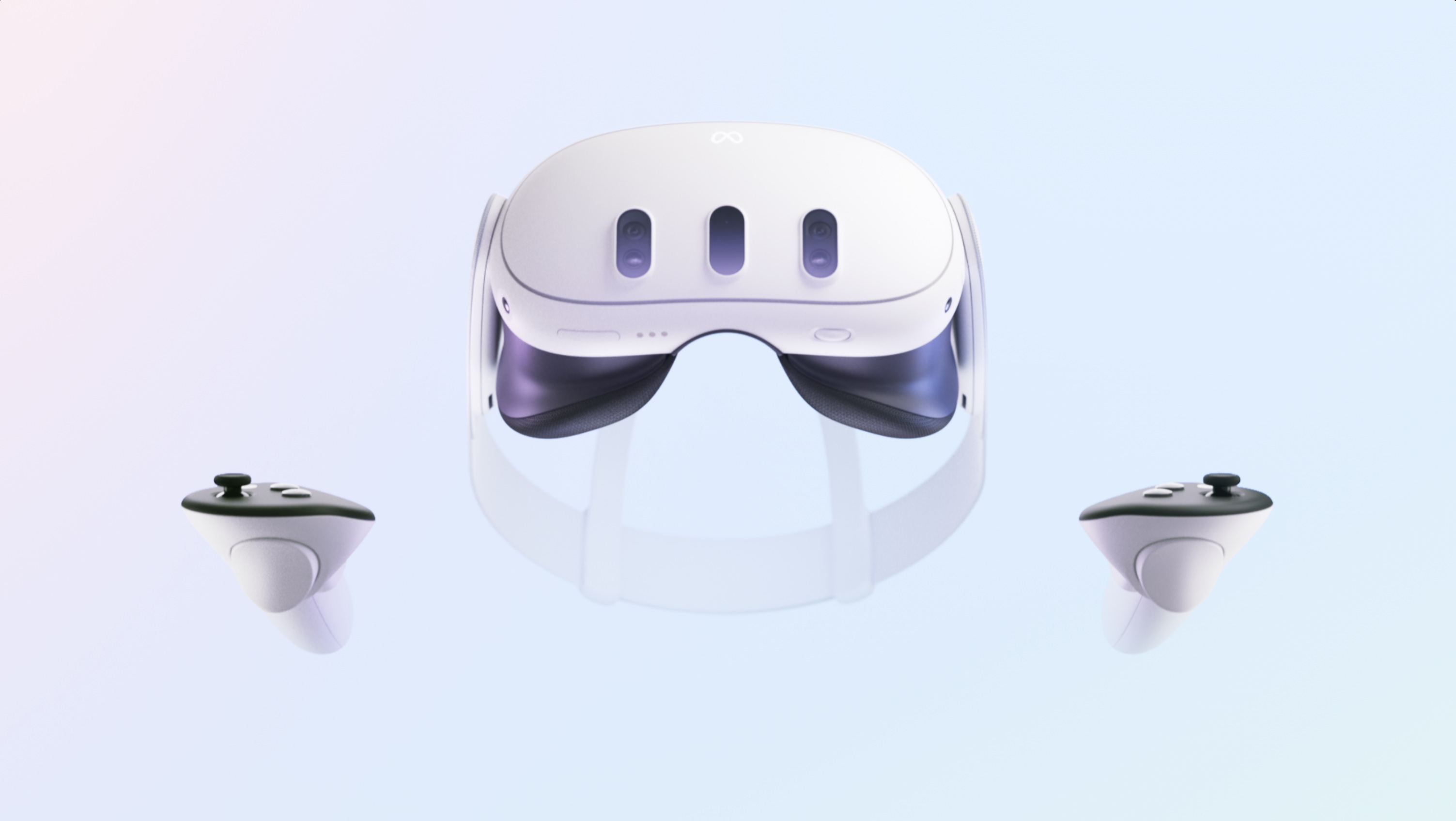
Meta used its Meta Connect 2023 developers conference to announce launch plans for the much anticipated Meta Quest 3 mixed reality headset. But that wasn't the only product to get a showcase today (September 27). We also got a look at the Ray-Ban Meta Smart Glasses, a follow-up to the first generation Ray-Ban smart glasses released two years ago. And Meta detailed its plans for AI, including new AI characters it had created that incorporate real-life celebrities to answer questions. Miss the Meta Connect 2023 keynote? We've got a minute-by-minute recap below, but here's the highlights of what the company formerly known as Facebook announced.
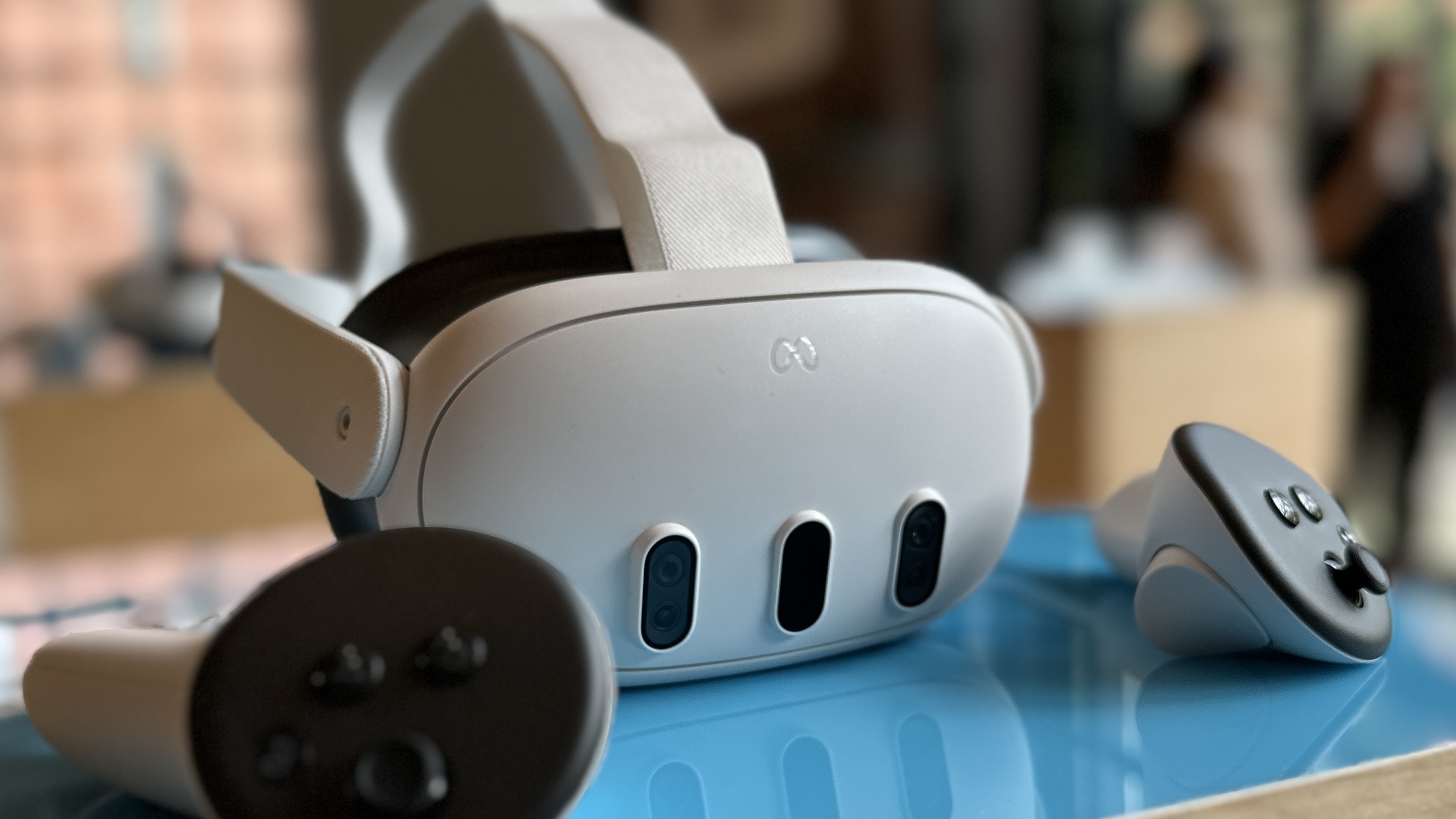
Meta Quest 3: Following up on an initial announcement this summer, Meta formally unveiled its latest headset. The Meta Quest 3 delivers a mixed reality experience, allowing you to impose virtual object over real world backgrounds when you're not in the full immersion mode. The Meta Quest 3 starts at $499 for a 128GB model — you can boost the storage to 512GB for $649. Preorders are underway now, with the device going on sale October 10. Read our Meta Quest 3 hands-on for initial impressions of the headset.
An earlier version of this report listed the wrong starting price for the Meta Quest 3. We've corrected the report.
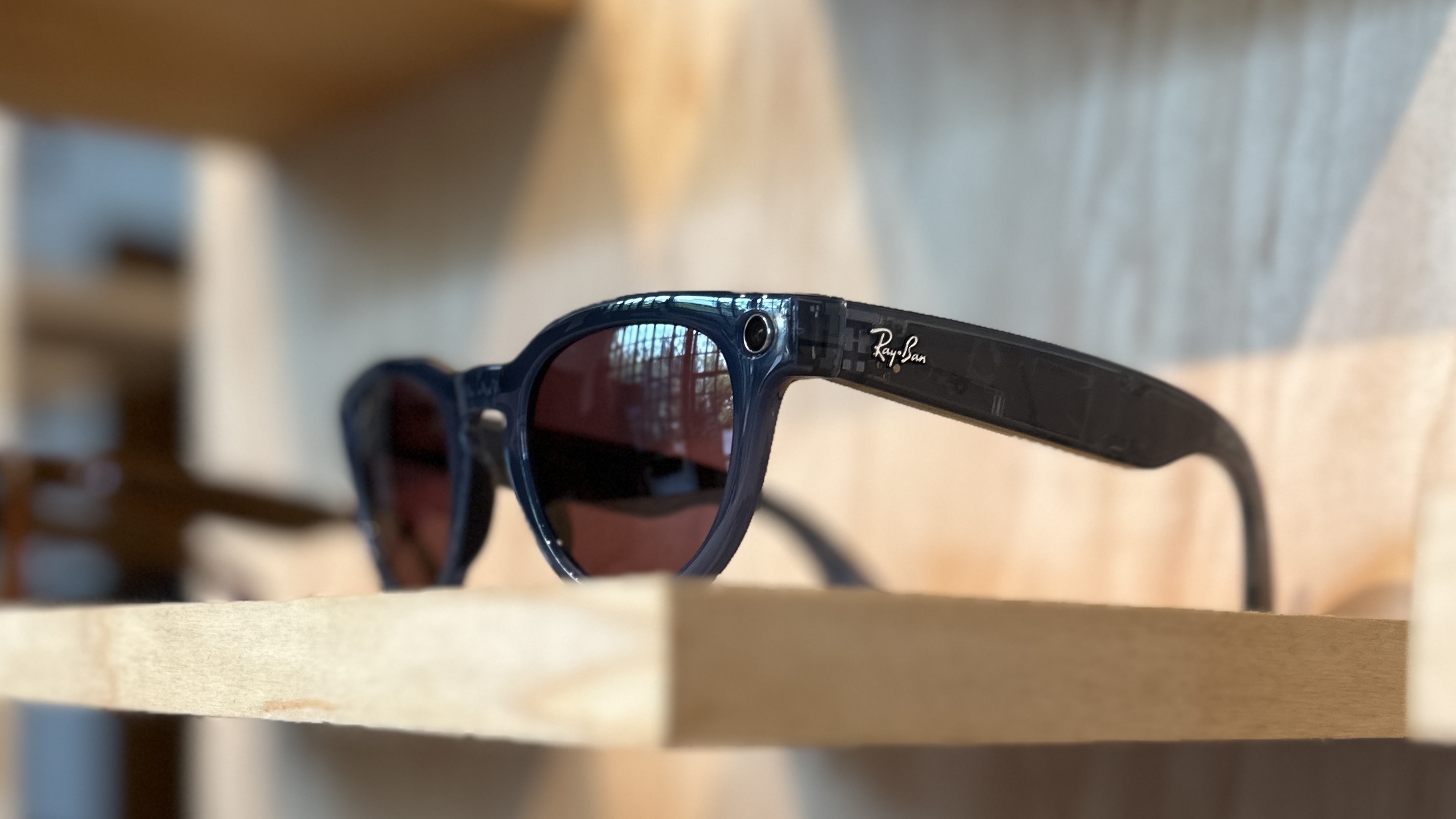
Ray-Ban Meta Smart Glasses: The latest version of this partnership between Ray-Ban and Meta look to improve upon the original smart glasses with a better fit, clearer audio and more storage. Camera improvements are central to the new glasses, with a different aspect ratio and enhanced stabilization. You can live stream now, too. Read our Ray-Ban Meta Samrt Glasses hands-on to see what we think about the improvements.

New AI chatbots: To show off its work with artificial intelligence, Meta demonstrated some AI chatbots it's been building with the idea of infusing more personality into the information retrieval aspect of the tool. Specifically, Meta has built chatbots around the personalities of 28 celebrities focused on various topics. You'll soon be able to interact with a Tom Brady-inspired AI on sports trivia or a Paris Hilton-inspired persona on true crime, with the chatbots coming to platforms such as Facebook, WhatsApp and Instagram. Read more on Meta's new AI chatbots.
Heading into todays event, here's a quick refresher on the Meta Quest 3 specs, some of which have been confirmed by Meta ahead of the headset's launch.
- Price: $499 (128GB) [Confirmed], $649 (512GB)
- CPU: Qualcomm Snapdragon XR2 (Gen 2)
- RAM: 8GB
- Storage: 128GB [Confirmed], 512GB
- Display: LCD with 2064 x 2208 pixels per eye
- Full-color passthrough: 4MP 18 PPD
- Refresh rate: 120Hz
- Weight: 509 grams
- Battery life: Up to 3 hours
- Backward-compatible: Yes [Confirmed]
- Connectivity: Wi-Fi 6, Bluetooth 5.0
We're hoping we get more information to confirm, or refute, some of those specs during the keynote itself.

We already know that the Meta Quest 3 is going to start at $499 for the 128GB version — Mark Zuckerberg told us as much back in June when first announcing the successor to the Quest 2. But the company also said a larger version was in the works, too, without announcing how much storage it would offer, let alone the price. A spec sheet leak from earlier this month gives us a better idea of how much storage the higher-end Meta Quest 3 will offer — it will reportedly be 512GB. More recently, leaked promotional materials reportedly from a source at Gamestop suggested that this 512GB version will cost $649. We’ll find out soon enough just how accurate these rumors about the second Meta Quest 3 will turn out to be.
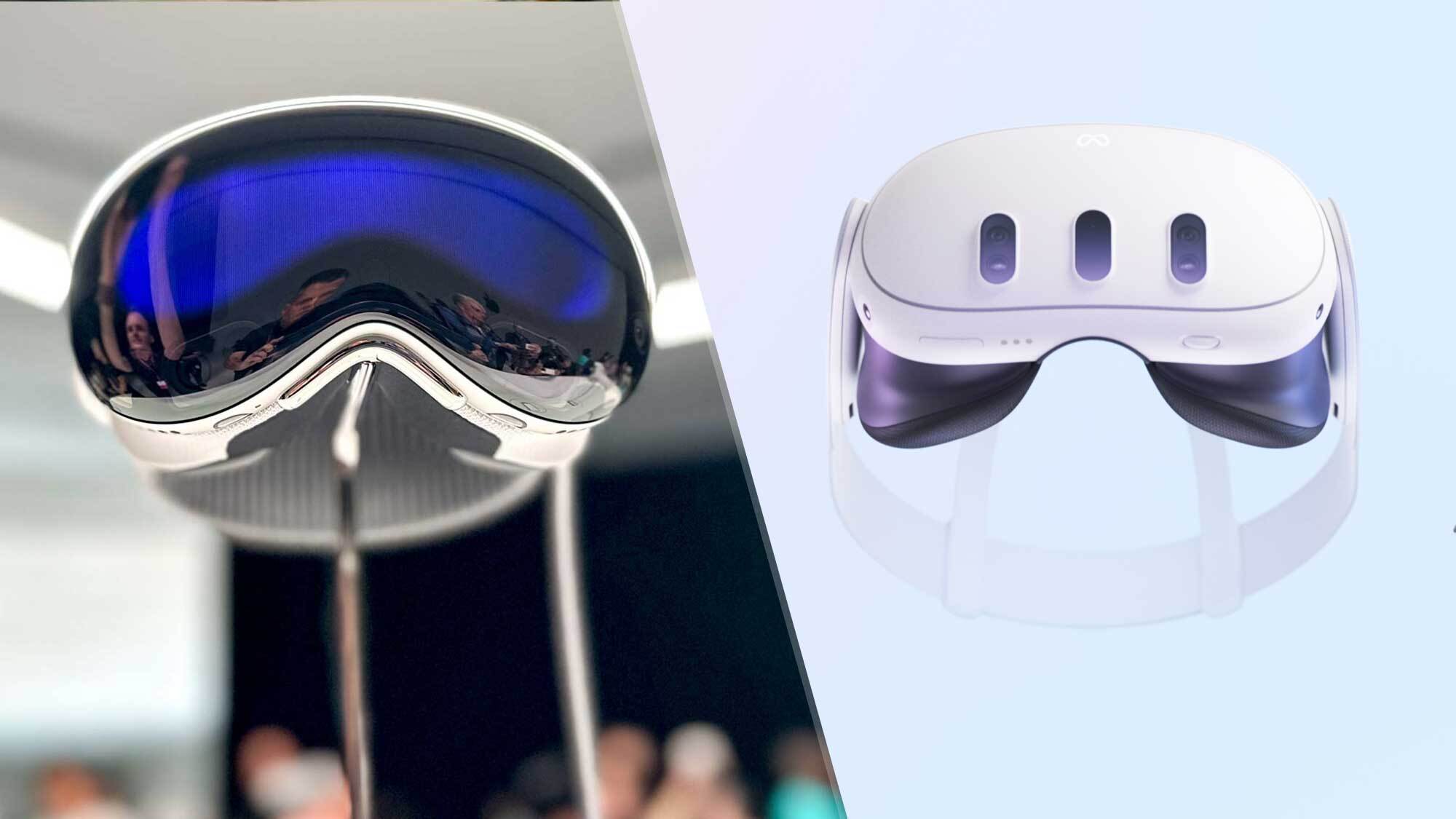
Inevitably, the Meta Quest 3 is going to draw comparisons to the Apple Vision Pro, Apple’s spatial computing headset previewed back in June and on track for a launch in early 2024. Well, you don’t have to scramble to figure out how Apple’s headset could compare with what Meta shows off today — we’ve already put together an Apple Vision Pro vs. Meta Quest 3 comparison based on what we know so far about both devices.

It’s highly likely that a pair of Ray-Bans smart glasses built in a collaboration with Meta will see the light of day during the Meta Connect keynote today. In that event, you may want to familiarize yourself with our Ray-Ban Stories review, which evaluated the first generation of these glasses. We appreciated how the original Ray-Ban Stories glasses could capture photos and video and also play music — we just didn’t think the smart glasses excelled at any of those tasks. The speakers on the glasses didn’t approach the sound you can expect from the best earbuds, while the cameras performed inconsistently. We also thought the voice commands were fairly limited. Here’s hoping that if a new version debuts today, the revamped Ray-Ban Stories glasses address some of those complaints.
Facebook gave us an early look at the Meta Quest 3 a few months ago. As a way of refreshing your memory about what we already know of this mixed reality headset, here’s the Meta Quest 3 teaser video from three months ago.
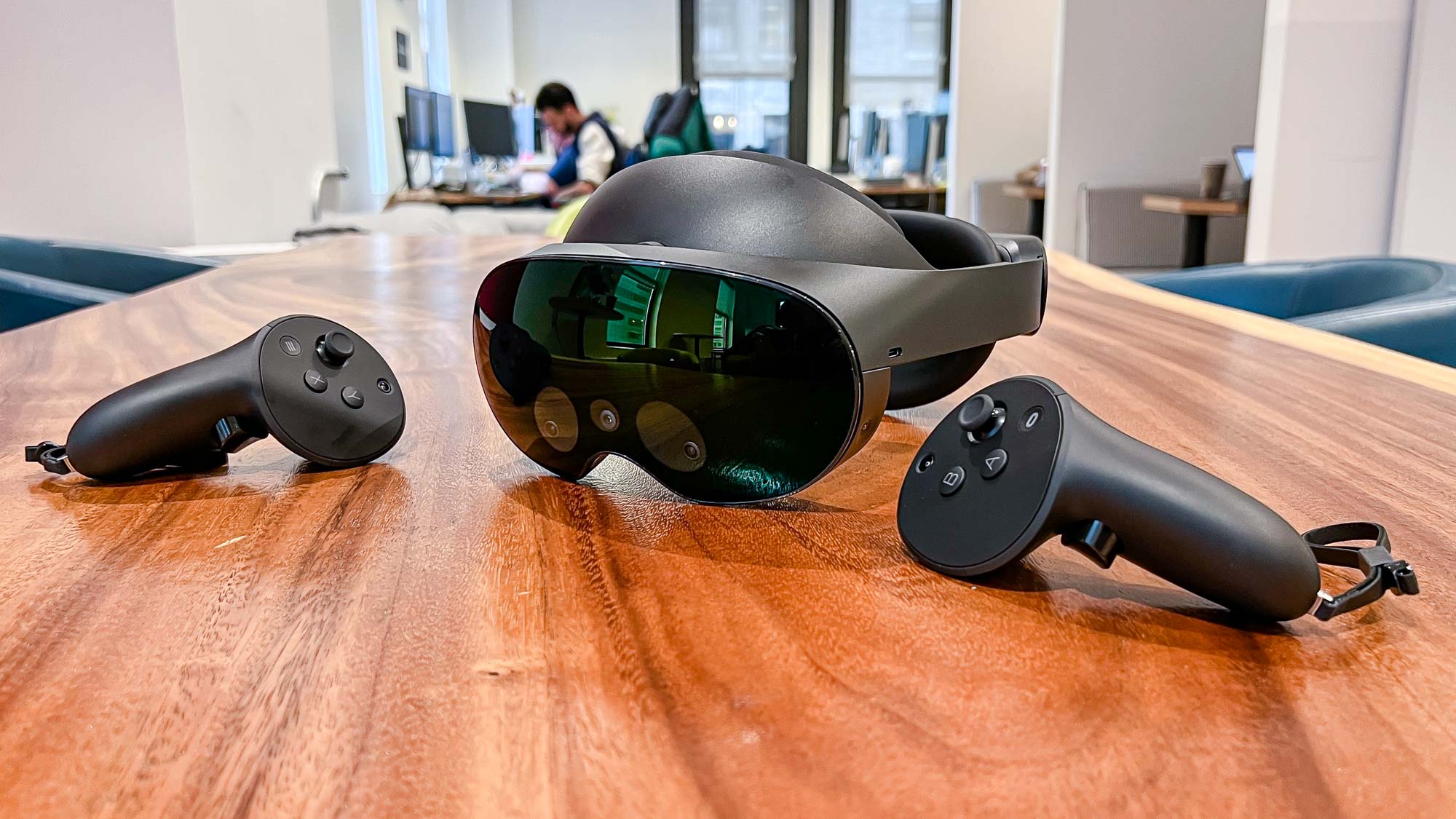
Despite being positioned as a successor to the Meta Quest 2, the Meta Quest 3 could bear a lot of similarities to the Meta Quest Pro. Leaked specs note that the headset has “high-fidelity, full-color passthrough powered by Meta Reality”, offering 48MP color video passthrough and 18 pixels per degree resolution. This sounds like a way for Meta to offer augmented reality experiences inside a more traditional-looking VR headset. In other words it’s not going to look like a pair of funky-looking or bug-eyed goggles — something more robust AR headsets are infamous for. Instead we’re looking at a headset that bears a striking resemblance to the Meta Quest 2, albeit skinnier and with pill-shaped cameras/sensors on the front. Of course the consequence of this being the Quest 3, with an appropriate price tag, means that those pass-through specs are not on par with the Meta Quest Pro. Fortunately the virtual reality experience should be significantly better.
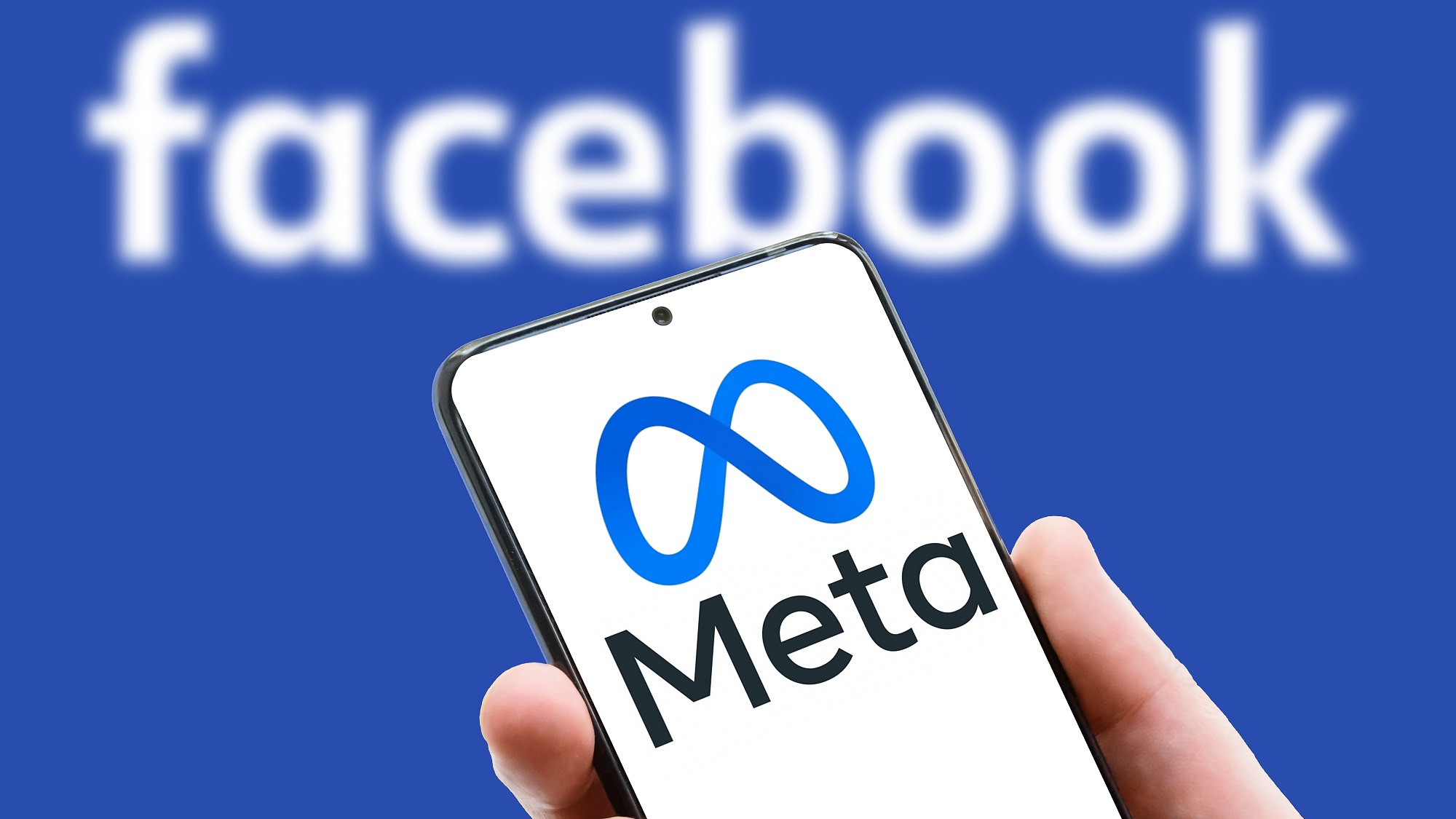
Meta Connect may not be a strictly hardware-only affair, no matter how much we might be eager to get our hands on new devices. Wall Street Journal recently reported that Meta could be readying “dozens” of generative AI chatbots for launch. Apparently each one will have its own distinct personality, and it’s expected that Meta will use those bots to try and attract younger users to its services. Meta sure loves a bandwagon, and the company has been hyping its AI ambitions for some time now. Details have been scarce, though WSJ claims that those bots will be characterized as names like Alvin the Alien or Bob the Robot (Surely that should be Rob?). Bob is expected to be similar to Futurama’s Bender, complete with sassy responses and “farcical humour that is resonating with young people.” Listen closely and you may be able to hear Steve Buscemi in the background greeting his fellow kids. Presumably these bots will be implemented on Meta platforms that today’s youth actually enjoys using. So Instagram, WhatsApp and possibly Messenger — though Meta has also confirmed plans to bring AI to Facebook.

While it’s pretty clear that we’re going to hear about the Meta Quest 3 today, the presence of new Ray-Ban Stories smart glasses is more up in the air. So why do we feel like this will be part of the agenda for Meta Connect? Because media reports seem pretty solid that a new version is on the way. Specifically, Lowpass’ Janko Roettgers has spotted an FCC listing for a product that sounds a lot like the Ray-Ban/Meta collaboration, and usually when we start seeing regulatory filings, a product launch soon follows. The listing mentions Wi-Fi 6 support, which would let the smart glasses transfer a lot of data quickly, so look out for that as a potential highlight of the new offering.
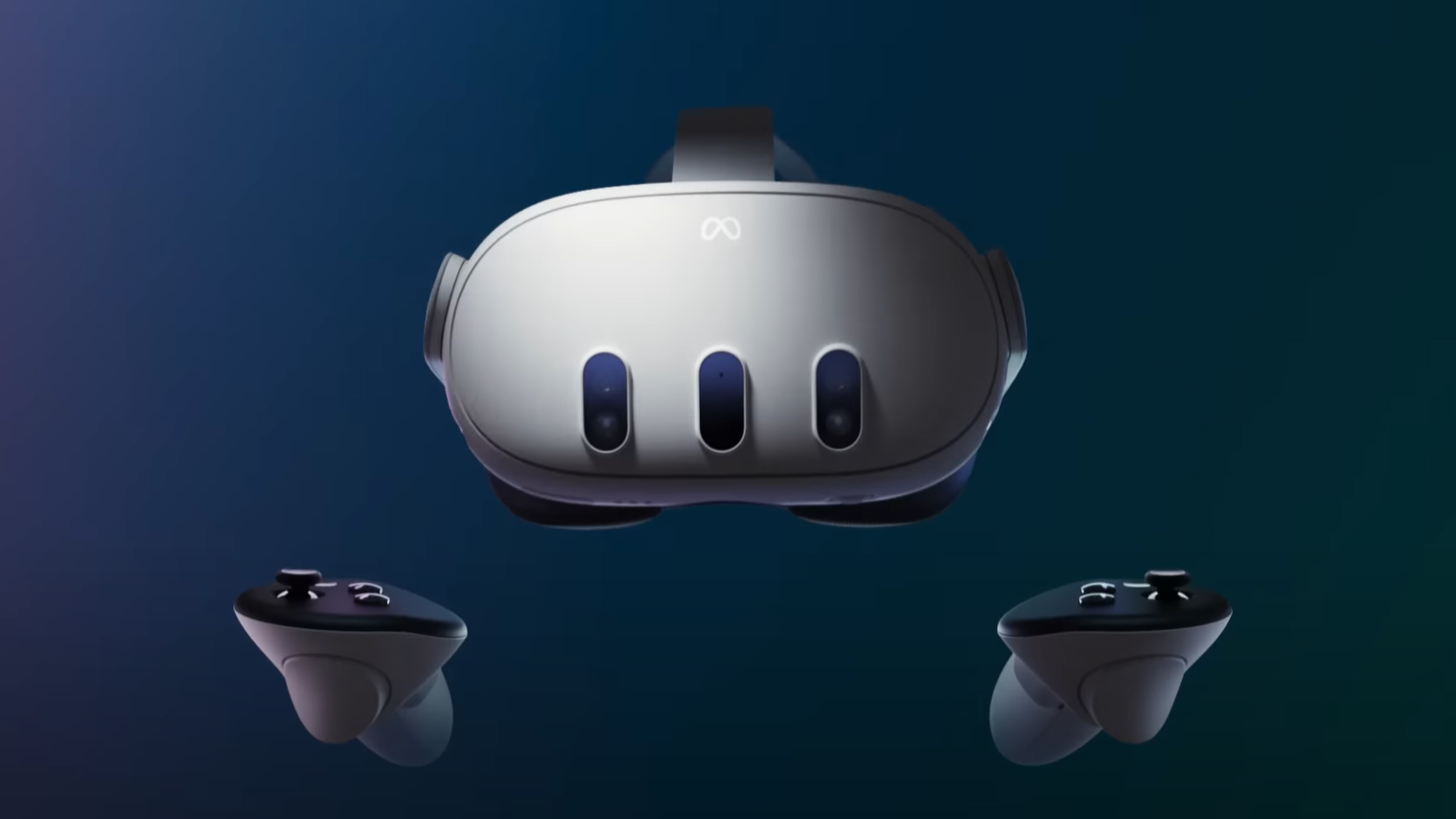
The front cameras on the Meta Quest 3 may offer more than just enable video pass-through capabilities and AR experiences. Leaked videos show that those cameras can also measure depth and take in your surroundings during use. It’s a feature called Smart Guardian, and it means the headset can map out the entire room, and ensure you have a safe space to enjoy VR without walking into furniture or knocking things over. We’ve all been there at some point, right? Meta hasn’t confirmed this feature just yet, but that would be a pretty serious upgrade over the Meta Quest 2. Least of all it means you won’t have to clear such a significant area before strapping the Quest 3 onto your face, and playing one of your games. Your lamps, vases, or whatever other freestanding decor you have will certainly thank you.

One of the big questions we have about today’s keynote is whether Meta will acknowledge the elephant in the room. I’m of course talking about that whole “metaverse” project the company spent the past few years, and multiple billions of dollars, trying to make happen. While the metaverse has its steadfast devotees, a lot of the concepts have been met with widespread derision on social media. Mocking Mark Zuckerberg’s cartoonish avatar, or the fact one of the major announcements at Meta Connect 2022 was that Horizon Worlds avatars would be getting legs. Recent months have seen Meta dial down its metaverse app to pretty-much zero. Instead, like the rest of Silicon Valley, the company has chosen to talk up its AI ambitions instead. So it’s not entirely clear whether the metaverse will get any attention this year, but anything that does happen will likely play second fiddle to AI-centric announcements
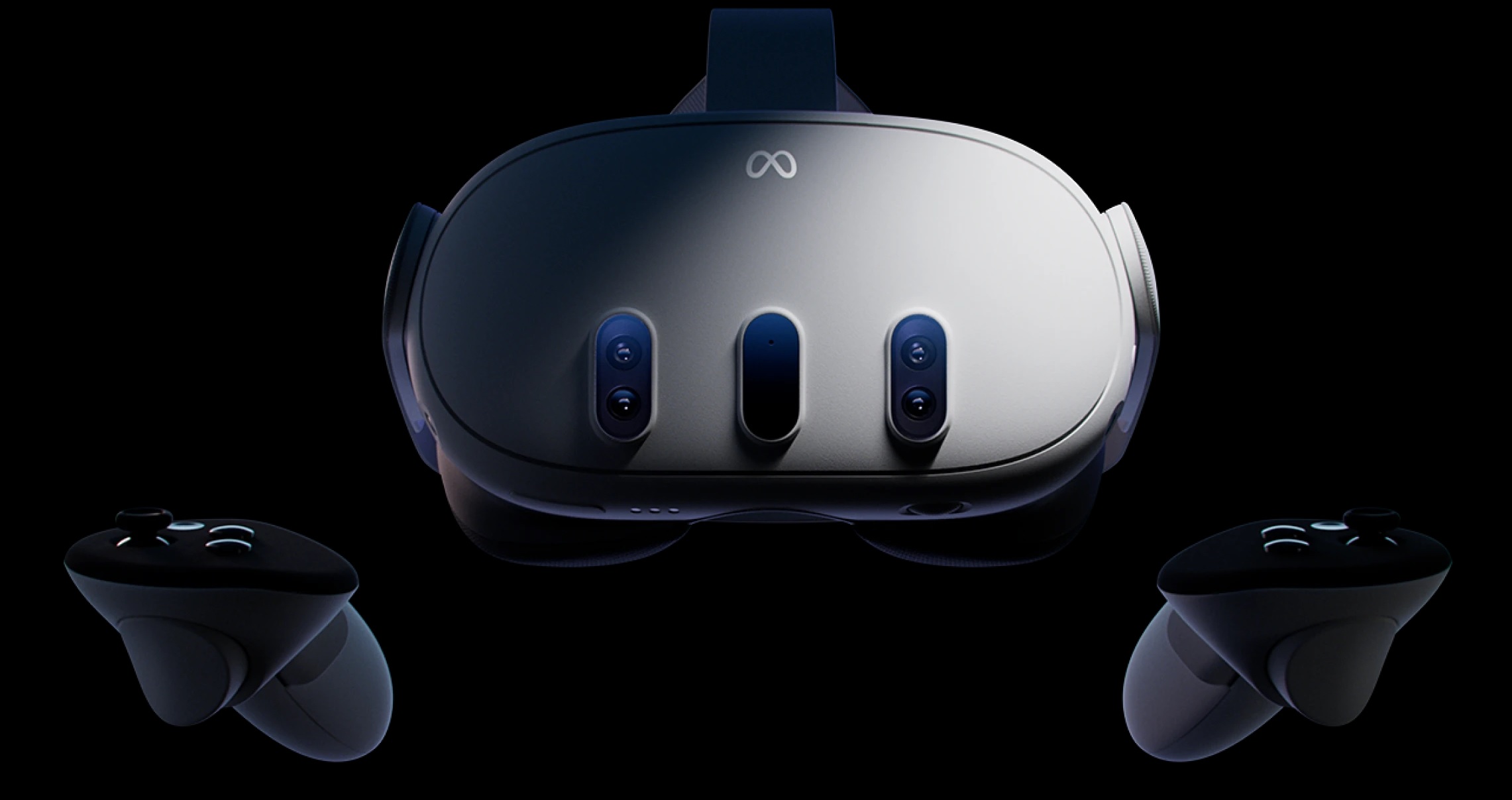
It sounds like the Meta Quest 3 won’t be short of upgrades in the hardware department. It’s rumored that the headset will come with the new Qualcomm Snapdragon XR2 (Gen 2) chipset. That’s expected to offer twice the amount of graphical power as its predecessor, which could ensure significantly better visuals. Of course all the graphical upgrades in the world would be meaningless without an appropriate display to go with it. Rumor has it that the Quest 3 will offer 2,064 x 2,208 resolution per eye — or roughly 30% higher than the Quest 2. It was also claimed that the headset will have a 120Hz refresh rate out of the box. As good as that is, we’d still love to see a headset push that number up to 144Hz in the near future. We may also get up to 12GB of RAM, but so far rumors haven’t quite decided whether we’ll get 8GB instead — either way it’s an upgrade from Quest 2
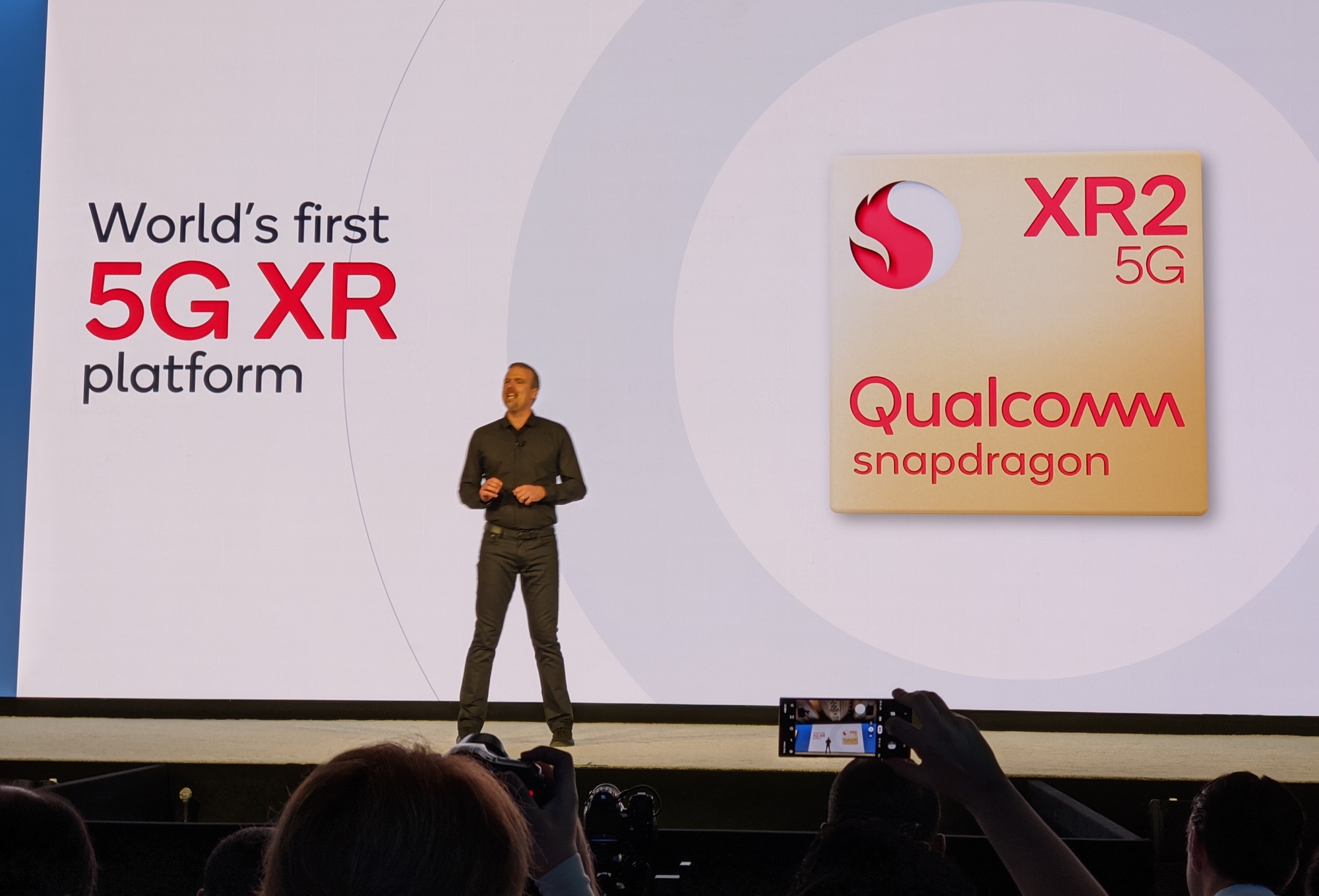
Qualcomm introduced the first Snapdragon XR2 chipset back in 2019, bringing 5G support to mixed reality platforms. We even saw a variation of that chip — the Snapdragon XR2+ — powering the Meta Quest Pro. So what will the Snapdragon XR2 Gen 2 reportedly slated for the Meta Quest 3 bring to the table? That's for hands-on testing to decide, but early reports have suggested a 2.5x increase in frames per second on some graphics benchmarks. Qualcomm has also said the chip offers a 50% improvement in sustained power over the first XR2 silicon.
It's from a week ago, but here's a Mark Zuckerberg instagram post in which the Meta CEO plays Super Rumble on a Quest 3. Seems like he should be preparing for his keynote, but what do I know.
We're expecting plenty of demos of this nature during today's keynote.

The focus today is obviously on Mark Zuckerberg's 10 a.m. PT keynote, but Meta Connect is a two-day affair. And if you want to look ahead to tomorrow, the opening sessions covers Meta Quest and mixed reality. "Join Meta Leadership as they walk through all things mixed reality and Meta Quest 3, and the cutting-edge capabilities and business strategies driving this next-generation product," reads the description of that keynote. You can tune in at 1 p.m. ET/ 10 a.m. PT/ 6 p.m. BST if that description strikes your fancy.
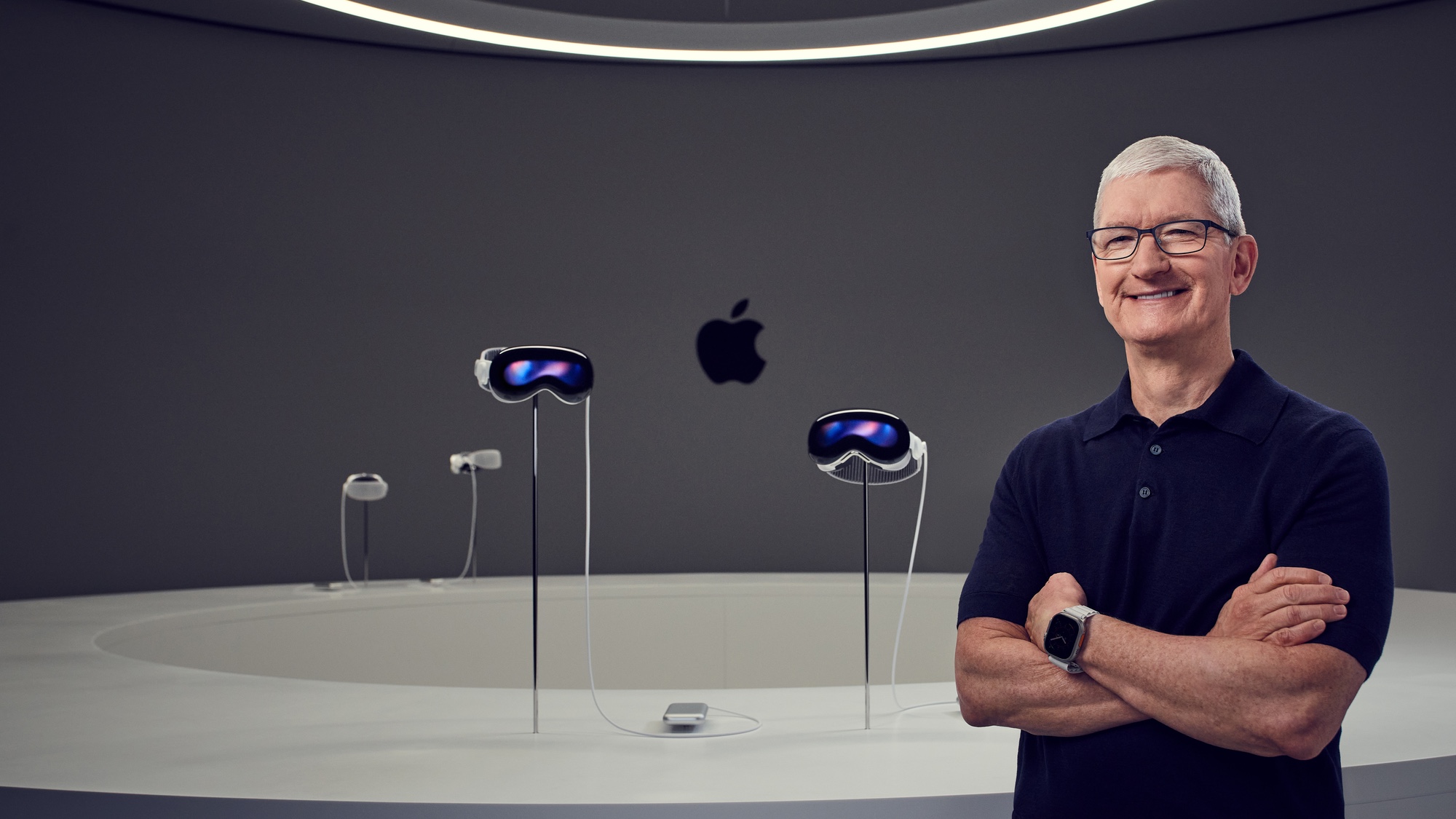
The uninvited guest at today's Meta Connect keynote will be the Apple Vision Pro, as pundits inevitably evaluate the Meta Quest 3 announcement in the context of what Apple plans to bring to the market. But the subtext to that is that the Vision Quest Pro figures to only be the start for Apple — it's widely assumed that Apple has a cheaper headset in the works as well. (Since the Apple Vision Pro costs nearly 8x the starting price of the Meta Quest 3, it's hard to imagine a more expensive version. Back in July, a report detailed Apple's ambitions for mixed reality (or spatial computing, as Cupertino prefers to call it), and it's worth a read this morning as we wait for Zuck and Company to take the stage in Menlo Park.

Malcolm McMillan, our man in Menlo Park, has arrived on the Meta campus to cover today's Meta Connect keynote and go hands-on with whatever products are on hand. And judging by that line to check in, it's good that he got there with 90 minutes to spare.
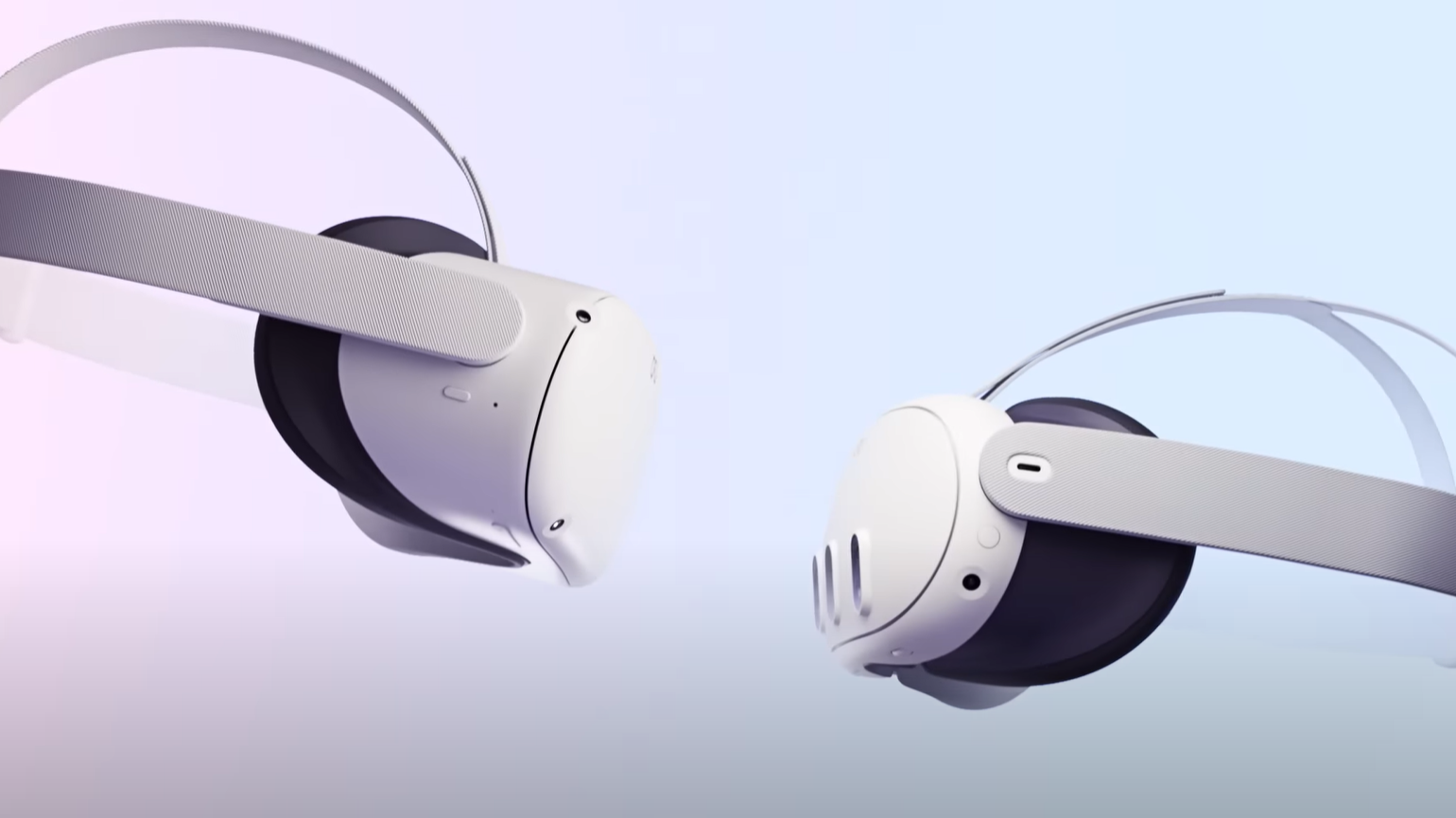
Full disclosure requires me to confess that I am a VR headset skeptic. Whether it's Meta's headsets (which I've tried) or ones from other companies that have come and gone, I've yet to find one that really convinces these devices have widespread appeal. My objections, in no particular order, to VR/XR/AR headsets as consumer devices:
- I don't find them particularly comfortable to wear.
- They lack the battery life to wear for sustained periods of time (even if they were comfortable to wear for that long).
- Apart from gaming, there's really nothing that VR headsets offer that you can't do just as effectively on some other platform.
Just after the Vision Pro preview, I wrote down my case against headsets. Perhaps today is the day that Meta convinces me I'm wrong.
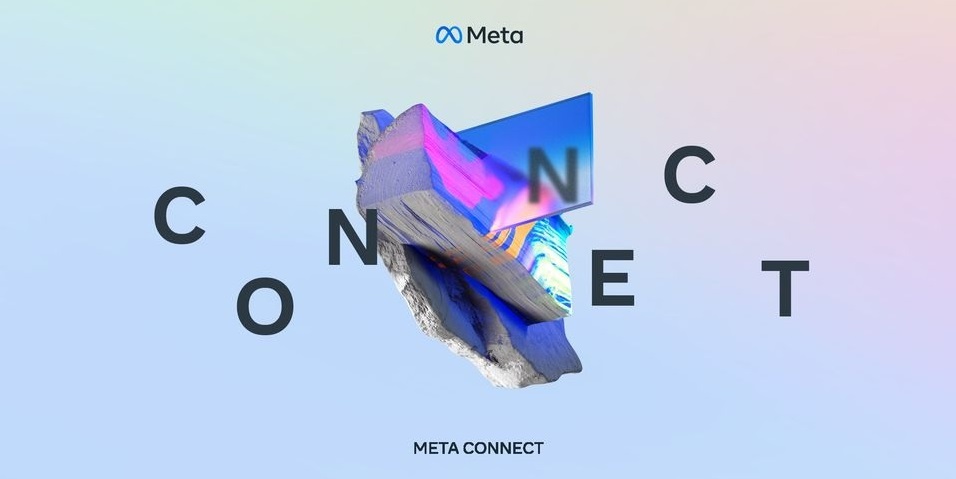
Meta Connect is loaded with keynotes today. In addition to the 1 p.m. ET keynote from Mark Zuckerberg, a Developer State of the Union talk begins just after the main keynote, Meta says that will begin around 2:45 p.m. ET/ 11:45 a.m. PT / 7:45 BST. You'll need to head to the Meta for Developers Facebook page for that second keynote.
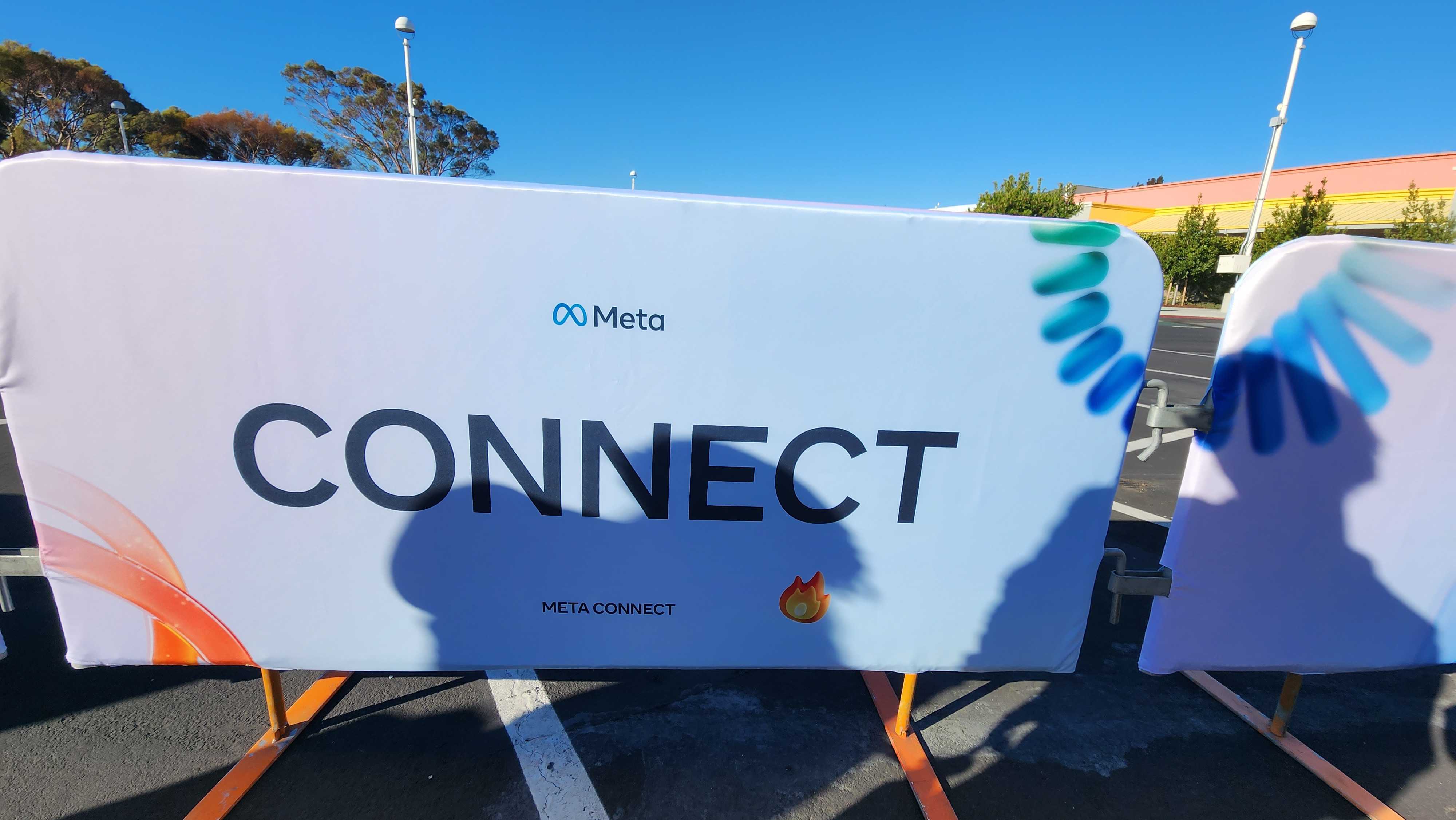
Slowly, Malcolm McMillan proceeds through security to the Meta Connect event. Sounds like it's going to be fire, eh Malcolm? "At the moment all that is on fire is my legs thanks to direct sunlight," he tells us.
Today is going to be our first official complete look at the Meta Quest 3. But if you flash back to August, some enterprising leaker claimed to get their hands on it early and tweeted out the results.
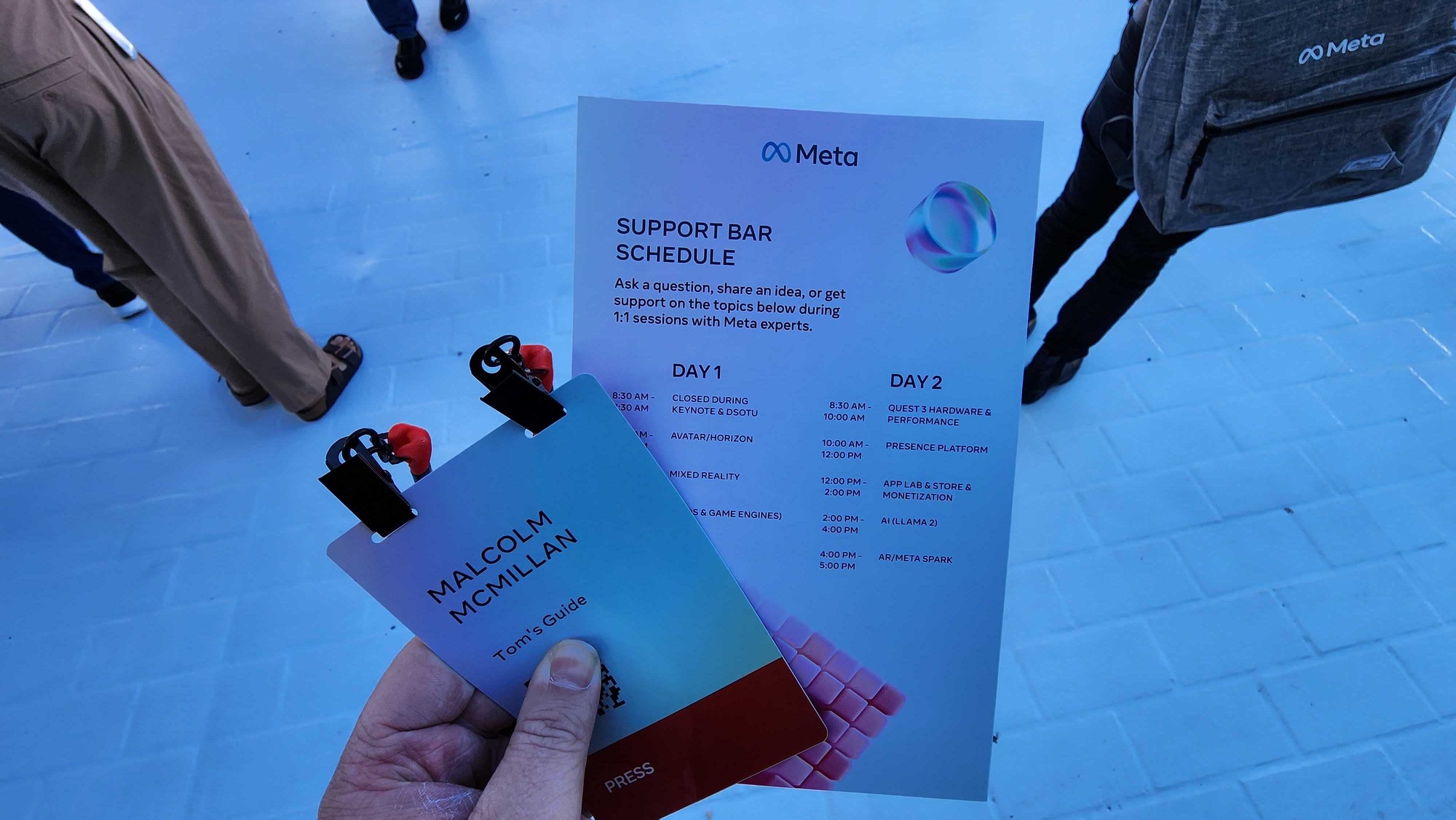
Press credentials are secured, and Malcolm McMillan is ensconced in the press room at Meta Connect, so our man on the scene is actually on the scene.

TIME CHANGE: From Menlo Park, Malcolm McMillan tells us that Meta is pushing back the start of today's keynote to 10:30 a.m. PT/1:30 p.m. ET. The half-hour delay is not a surprise if you've been following the difficulty of getting people into the venue for today's presentation.
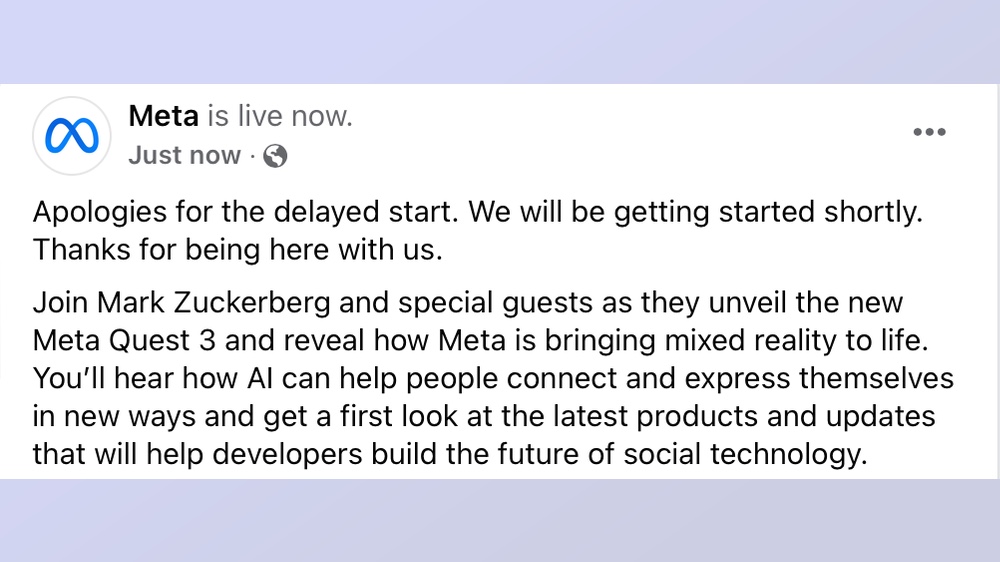
The official word from Meta on the delay until 1:30 p.m. ET/10:30 a.m. PT. At least the live feed is now live-ish on the Meta Facebook site.
Here's a TikTok on today's events to tide you over while Meta readies itself for the delayed keynote.
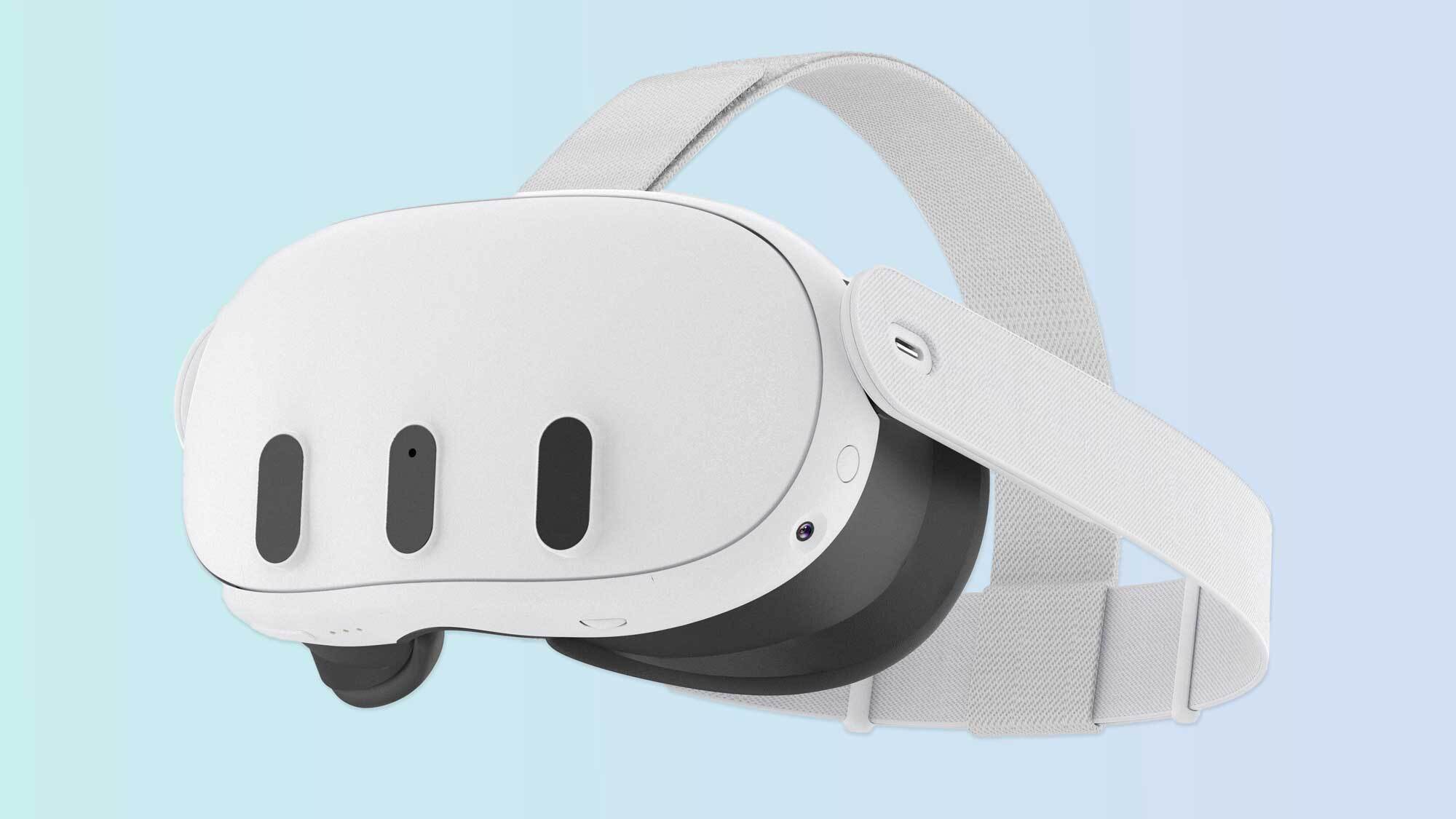
One question about the Meta Quest 3 — will Meta Quest 2 accessories work with it? A leaked image reportedly showing the Quest 3's head strap suggests that it's too long for forward compatibility for older accessories. Perhaps this is something that Meta will confirm or deny in 5 minutes time.

I'm no broadcast technician, but that's not a good sight to see.
At present, Meta's feed went black and then the 30-minute countdown restarted. We'll see if this show gets on the road.
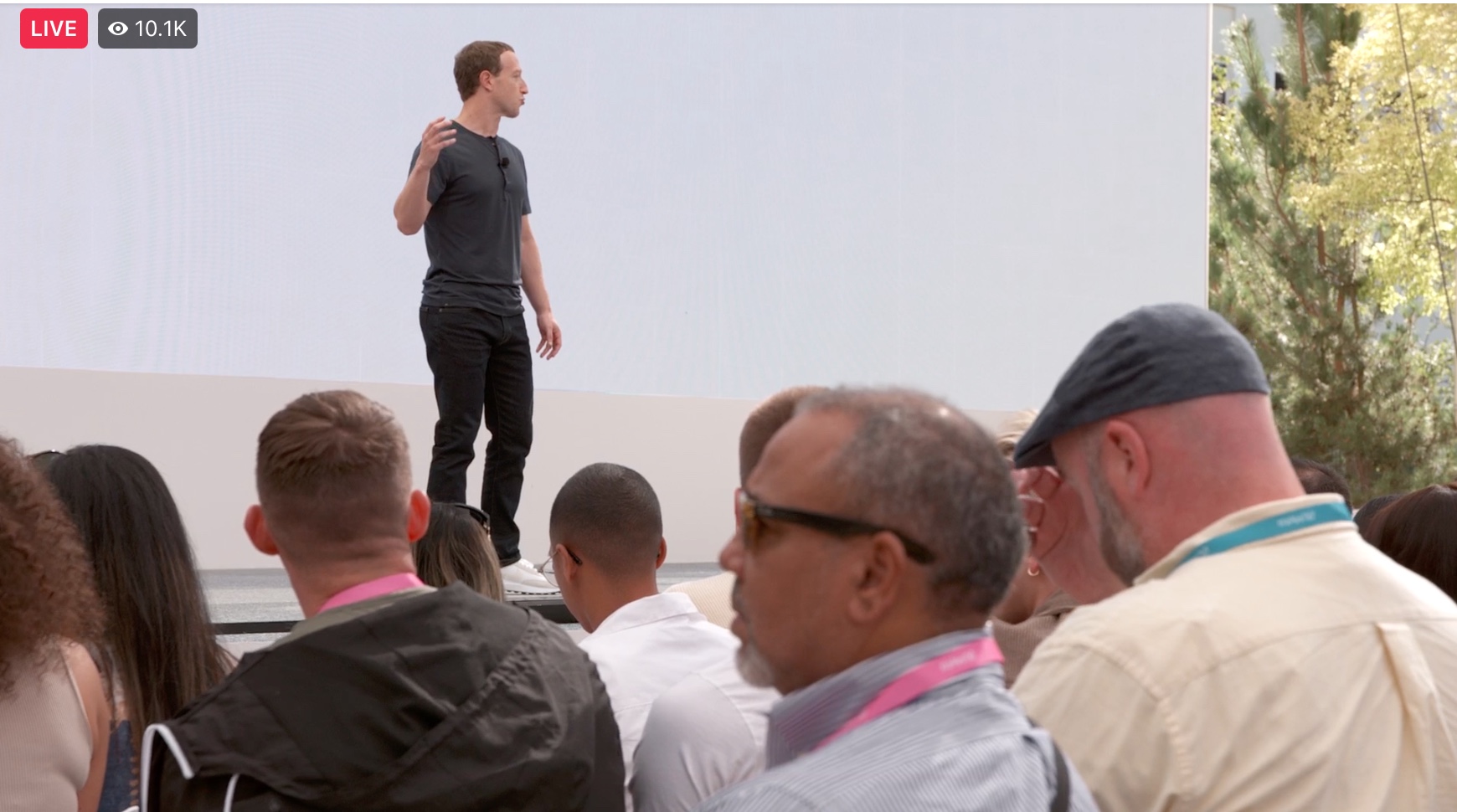
OK, we're live now. Try this Meta Connect feed if you're having trouble finding the live video. All you've missed is Mark Zuckerberg musing about the physical and digital coming together in the metaverse.
We start out with Zuckerberg officially announcing Meta Quest 3. You can see the physical room around you but it's a "canvas" to bring digital objects into the real world.
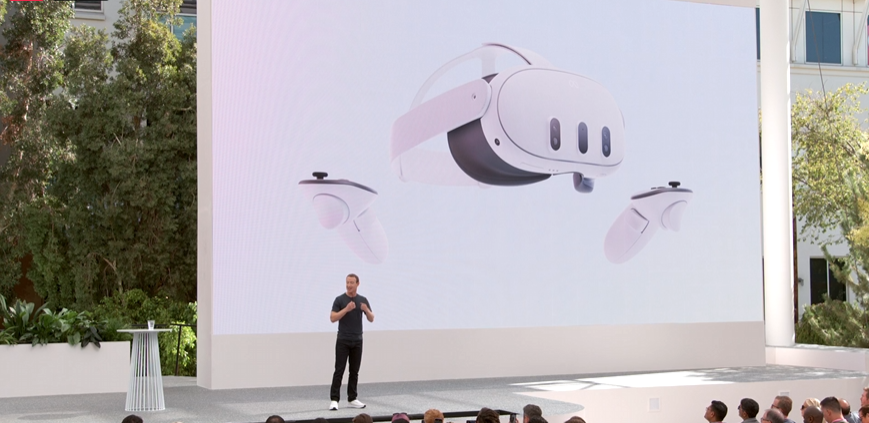
Quest 3 shows the physical space with 10x more pixels than Quest 2 could use. You can drop a video screen right in your room. Also, Xbox Cloud Gaming will come to Quest in December. You'll be able to play on a massive screen anywhere you go.
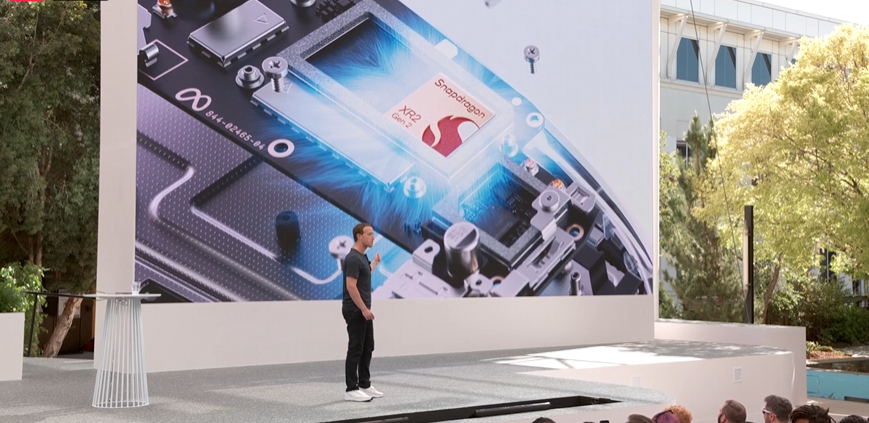
It's confirmed: Snapdragon XR2 Gen 2 is powering the Quest 3 -- twice the graphics power of before. We're getting a demo of various games coming to Quest 3 like Assassin's Creed Nexus, with Zuckerberg talking about how stunning they look on the Quest 3. Roblox is launching something too. You'll be able to watch fully immersive NBA games, some mixed martial arts fighting, and other live sports. Zuckerberg promises new Horizon comment to many cheers from the audience.
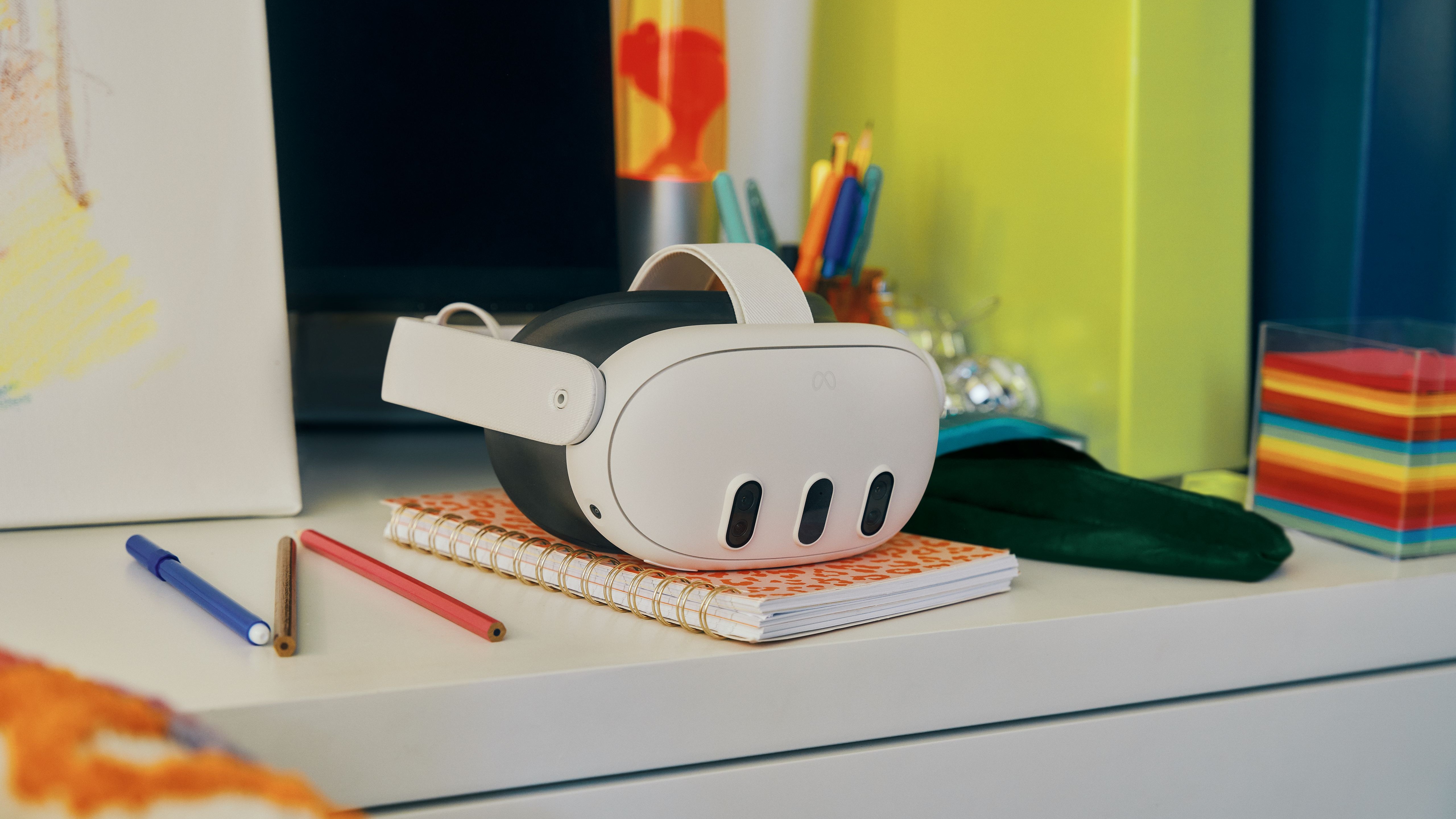
While Zuckerberg gives a rundown of Quest 3, you can read our Quest 3 hub to get the full details on what we know about the headset.
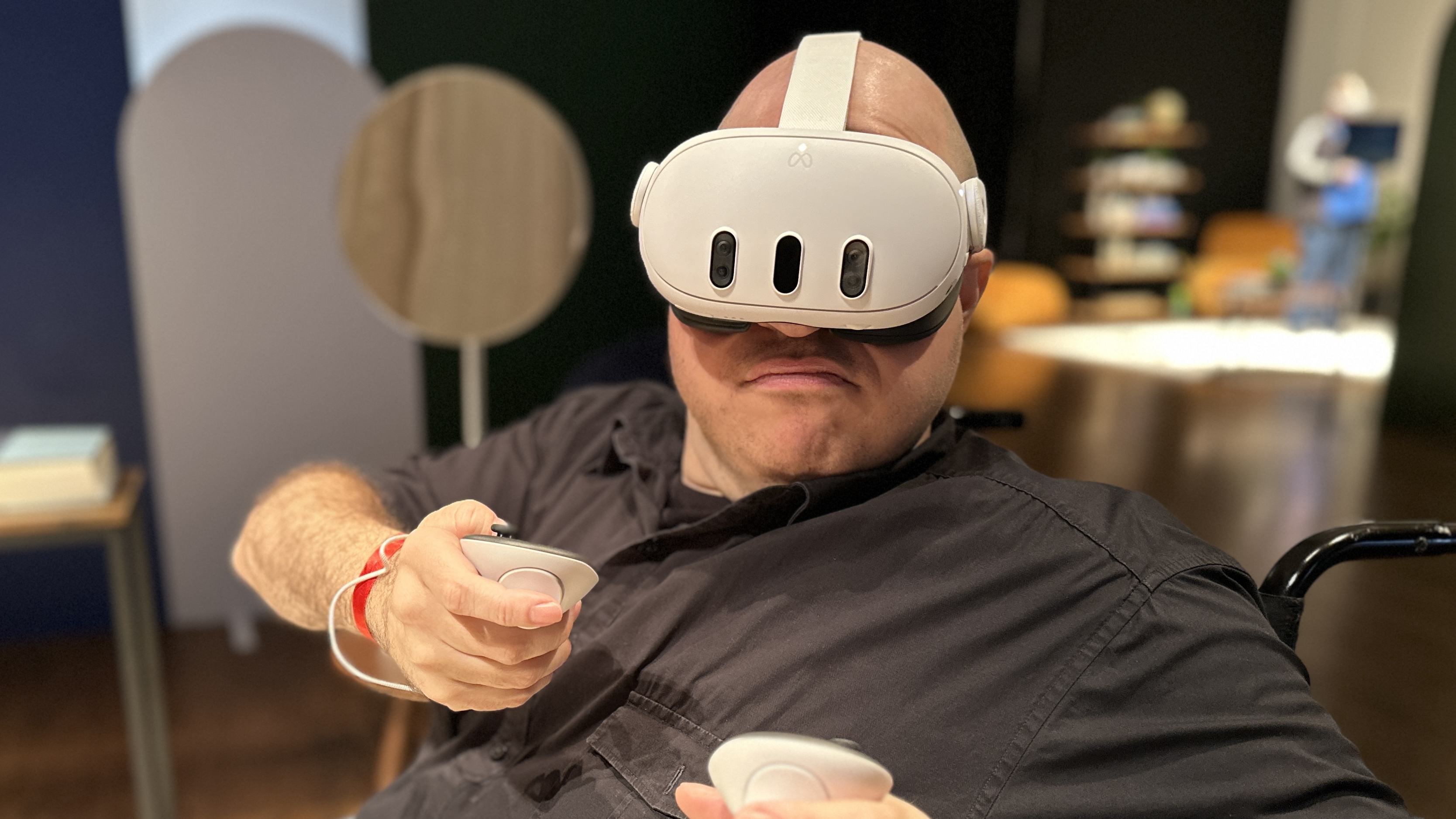
Quest 3 ships October 10. (Not August 10 as Zuckerberg just said.) It starts at $499. Read our Quest 3 hands-on to see our first impressions of the headset.
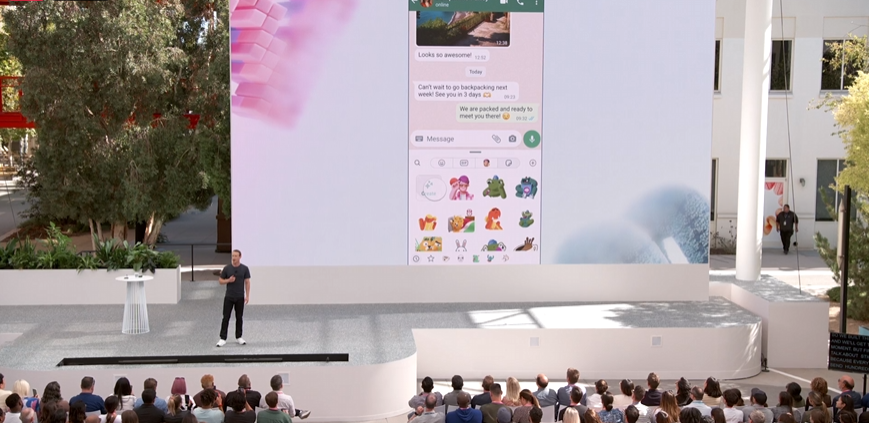
So we're talking about AI now. Meta is bringing AI editing tools to Instagram next month, and today across all its platforms, there are AI-powered tools for converting things into stickers. (Sounds like the new Stickers tools in iOS 17 to my iPhone-centric ear.)
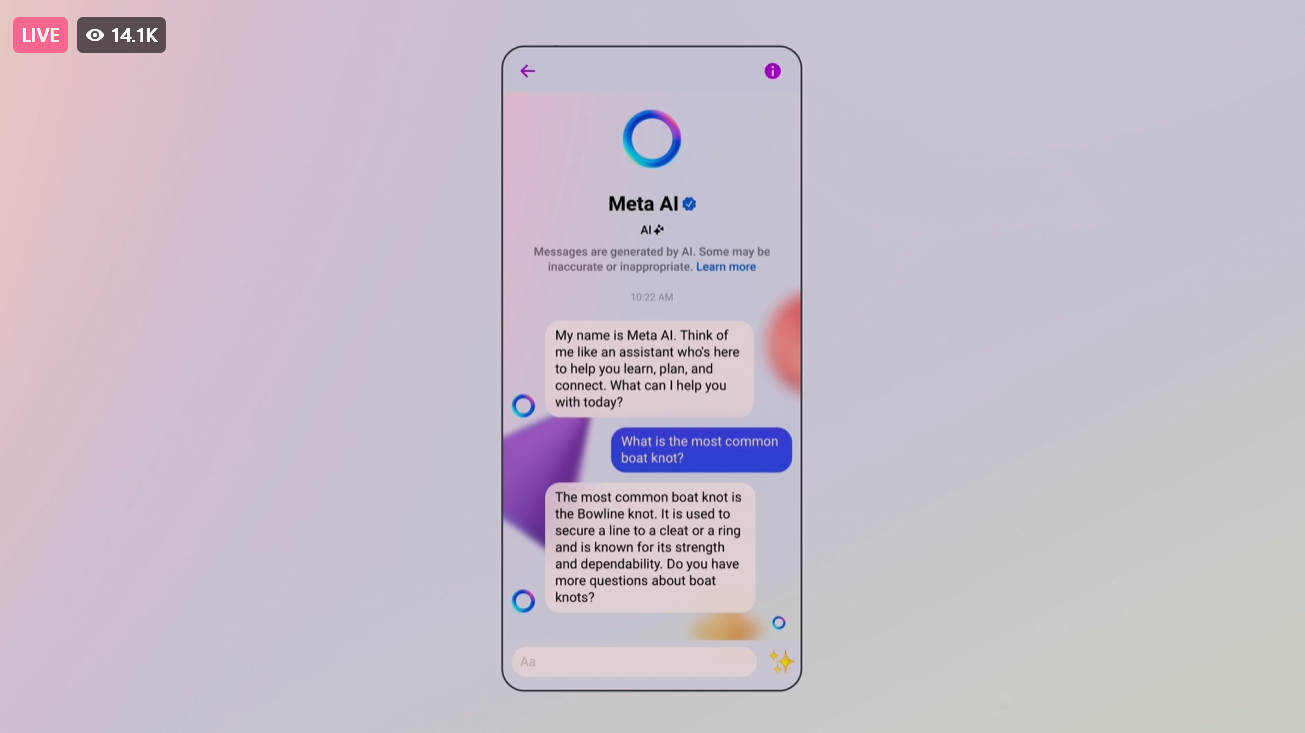
Meta says it's building a platform for creating AIs to get things done or just have fun. They'll work across Meta's various different platforms like Facebook and whatnot. It's opening up to developers and new use cases soon. Meta's been creating its own AIs and will roll them out soon in beta. Meta AI is a basic assistant that you can talk to like a person. (Like Siri. Or Google Assistant. Or Alexa...) It's based on Llama2, but it also draws on a partnership between Meta and Microsoft.
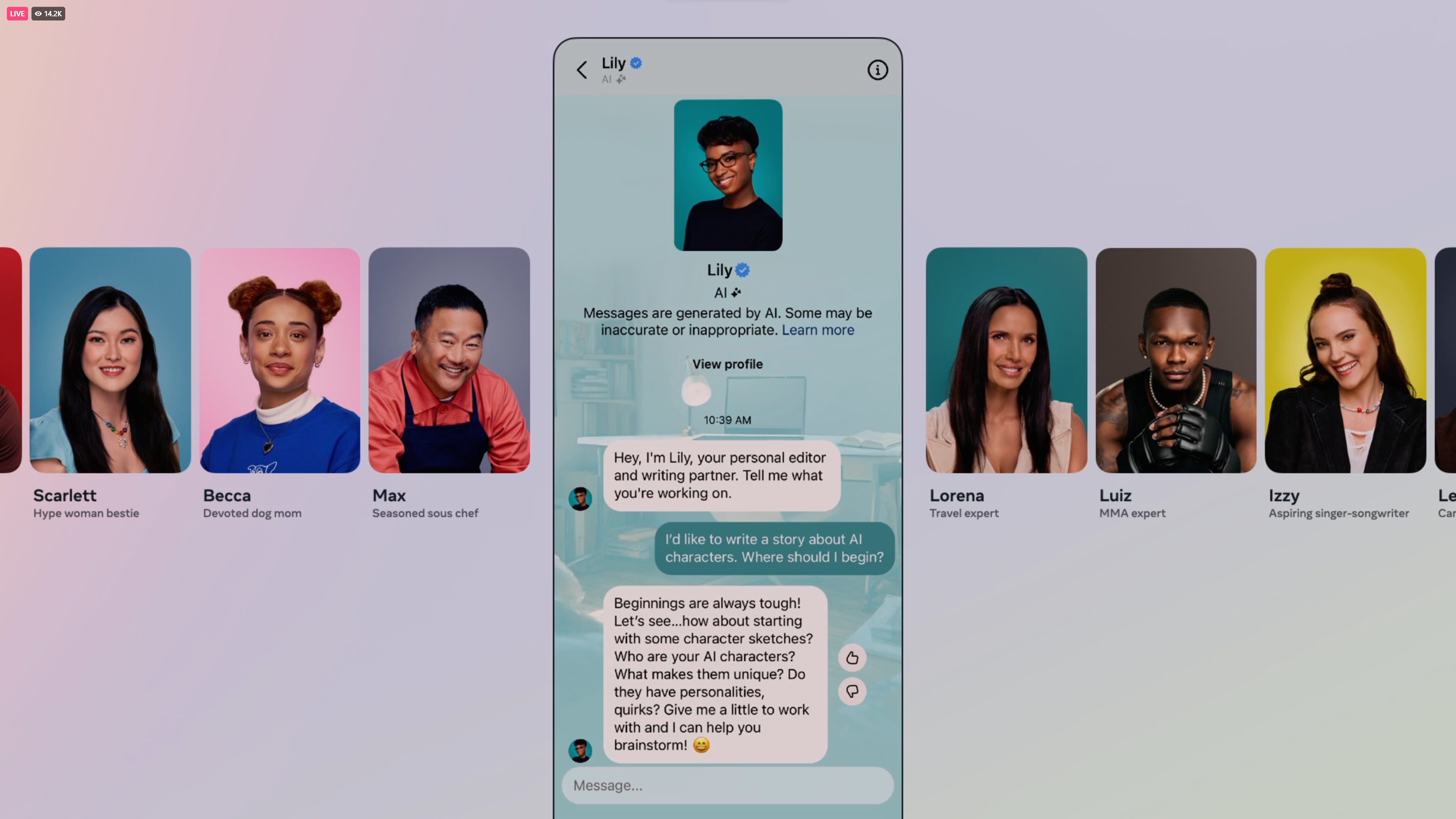
Zuckerberg says they've also been experimenting with more fun AIs. Two examples — Max the Sous Chef, who can make suggestions on recipes, or Lilly, a personal editor AI, who can help you edit text. And there's another AI with trip/travel suggestions. "A lot more are coming," Zuckerberg says.
Meta's work with AI isn't just about answering queries. It's also aiming for entertainment and connecting with people and helping you get things done. An example here is an AI called Victor (played by basketballer Dwayne Wade) that can help you get in shape. Zuckerberg seems particularly enamored with a Snoop Dogg-influenced DungeonMaster you can drop into your RPGs. So that's one of us that's amused.
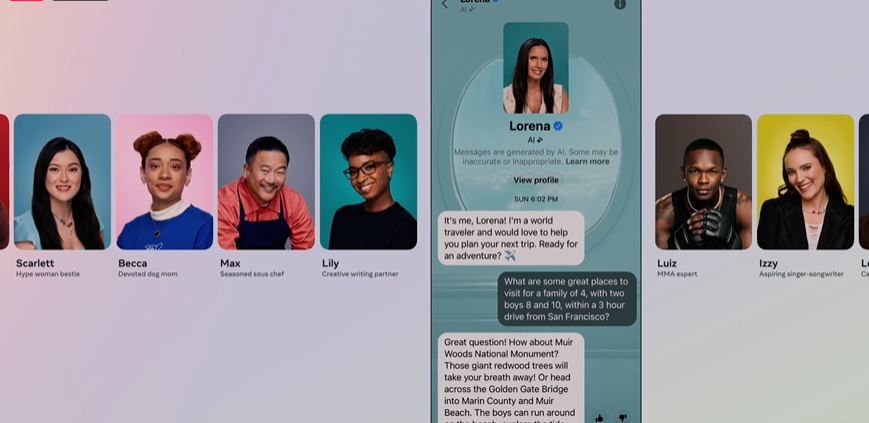
Anyone, it's good to see Kendall Jenner and Paris Hilton getting work as Meta-built AIs.

Meta is announcing AI Studio for its developer audience so that they can build these kind of AIs, too. There will be a sandbox for training AIs that's coming early next year. Is this all coming to the metaverse? You bet it is.
Zuckerberg says he's optimistic about AI and how it will enable new uses. He also thinks it's going to transform Meta's various platforms. And he's interested to see how the advances in AI intersect with building new computing platforms. That's a segue to the Ray-Ban smart glasses, by the way.
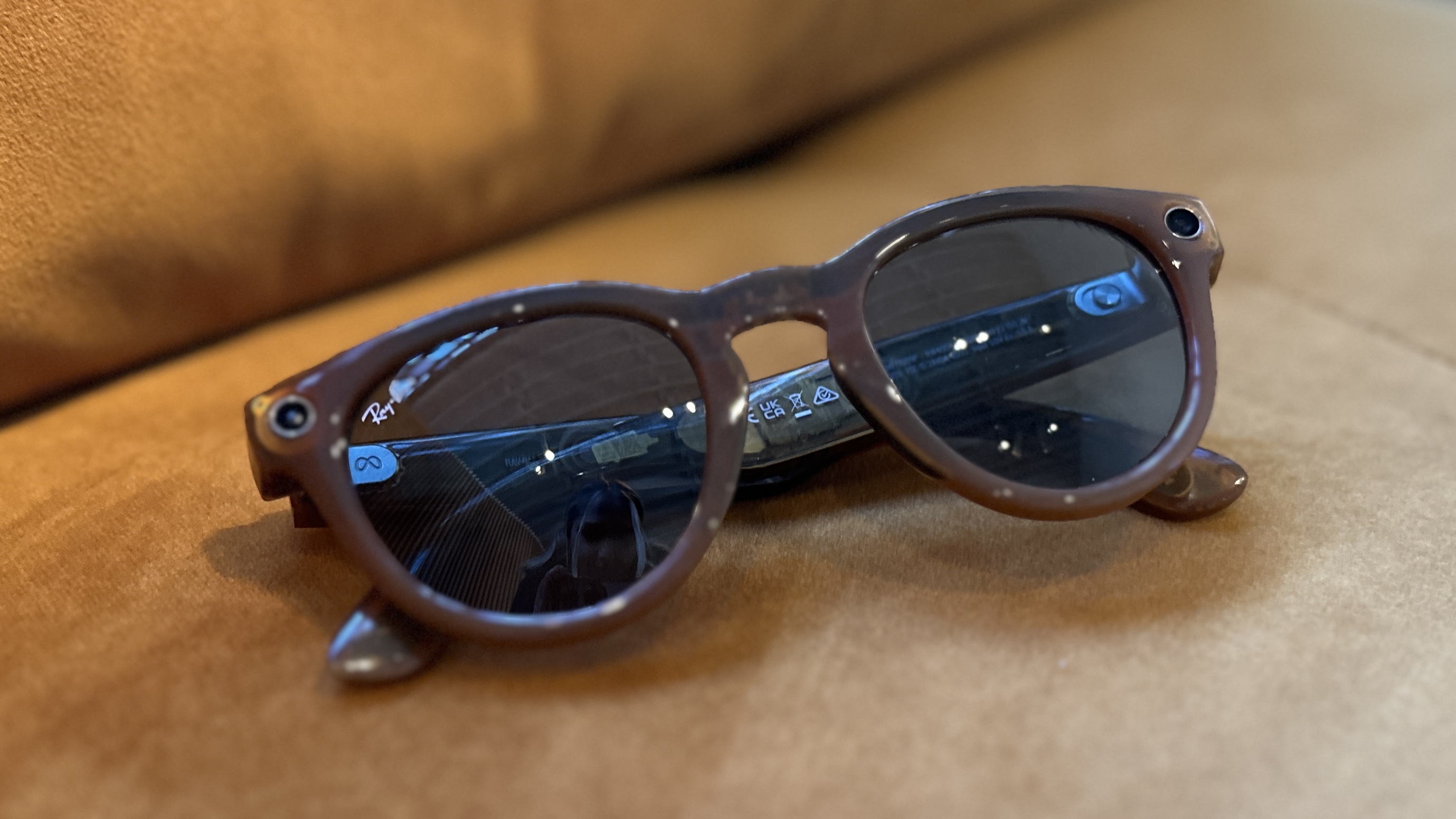
The new Ray-Ban glasses are the first smart glasses shipping with Meta AI built into them. So you'll have an on-board assistant. Next year, a software update will make the assistant multi-modal so that it can recognize what you're looking like — the idea is that you'll be able to ask the AI to identify objects or translate signs among other things.

Kate Kozuch has gone hands-on with the Ray-Ban Meta glasses, and can tell you how they're supposed to improve upon the original version of the smart glasses.

We get a demo of the live streaming capabilities of the Ray-Ban Meta smart glasses with F1 driver Charles LeClerc.
They'll launch October 17, starting at $299. The glasses, that is, not Charles LeClerc.
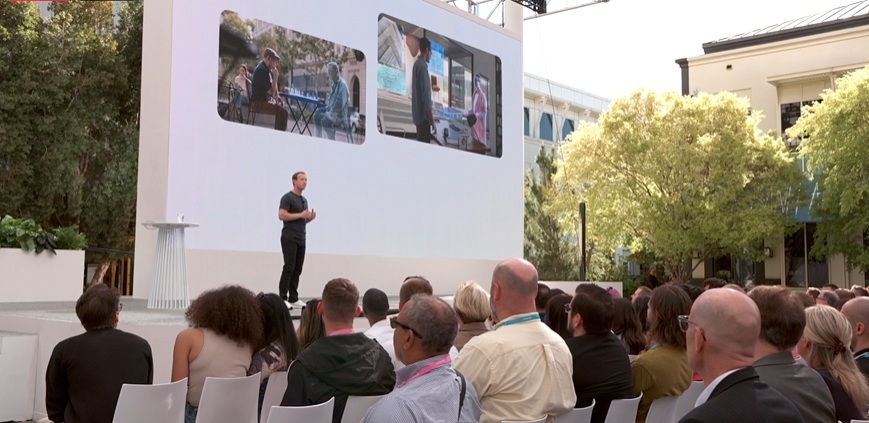
And that appears to be all that we're seeing in this keynote. Was it worth the half-hour delay? That's for you, the consumer, to decide, my friends.
Oh, that was just the end of Zuckerberg's involvement. Andrew Bosworth, Meta's chief technology officer, is now on the stage to give us a deeper dive into what we just heard about.
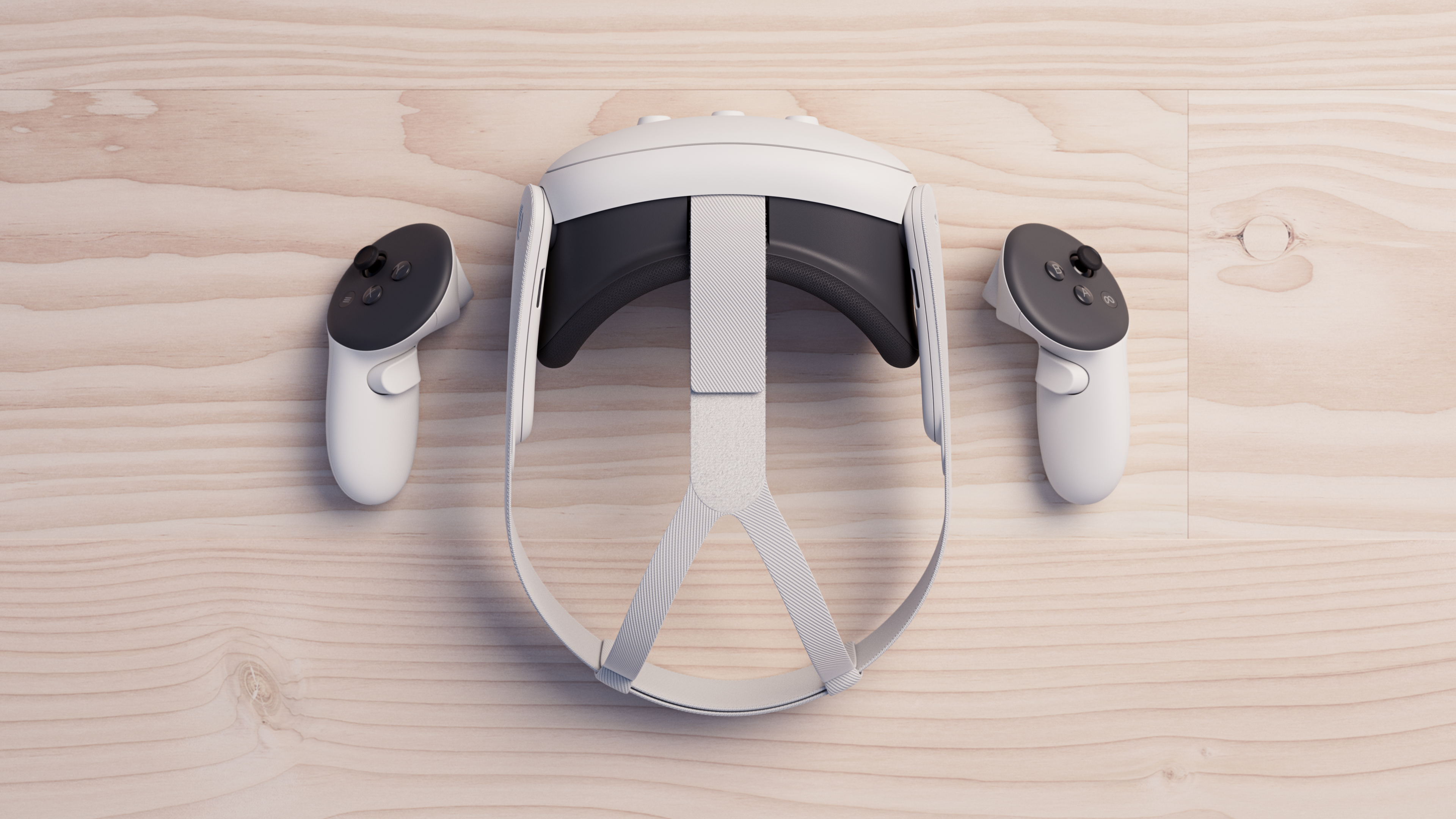
The Quest 3 recap starts with talking about the merits of mixed reality, which is what the new headset brings to the table. All you have to do is double-tap to switch between a fully immersive space and a mixed environment.
The Meta Quest 3 has a thinner profile than previous Meta headsets, and it adopts the pancake lenses introduced with the Quest Pro. You can also choose your own color straps and insets for the first time.
It's “the best value spatial computing headset,” Bosworth says, which seems to refer to the Apple Vision Pro.
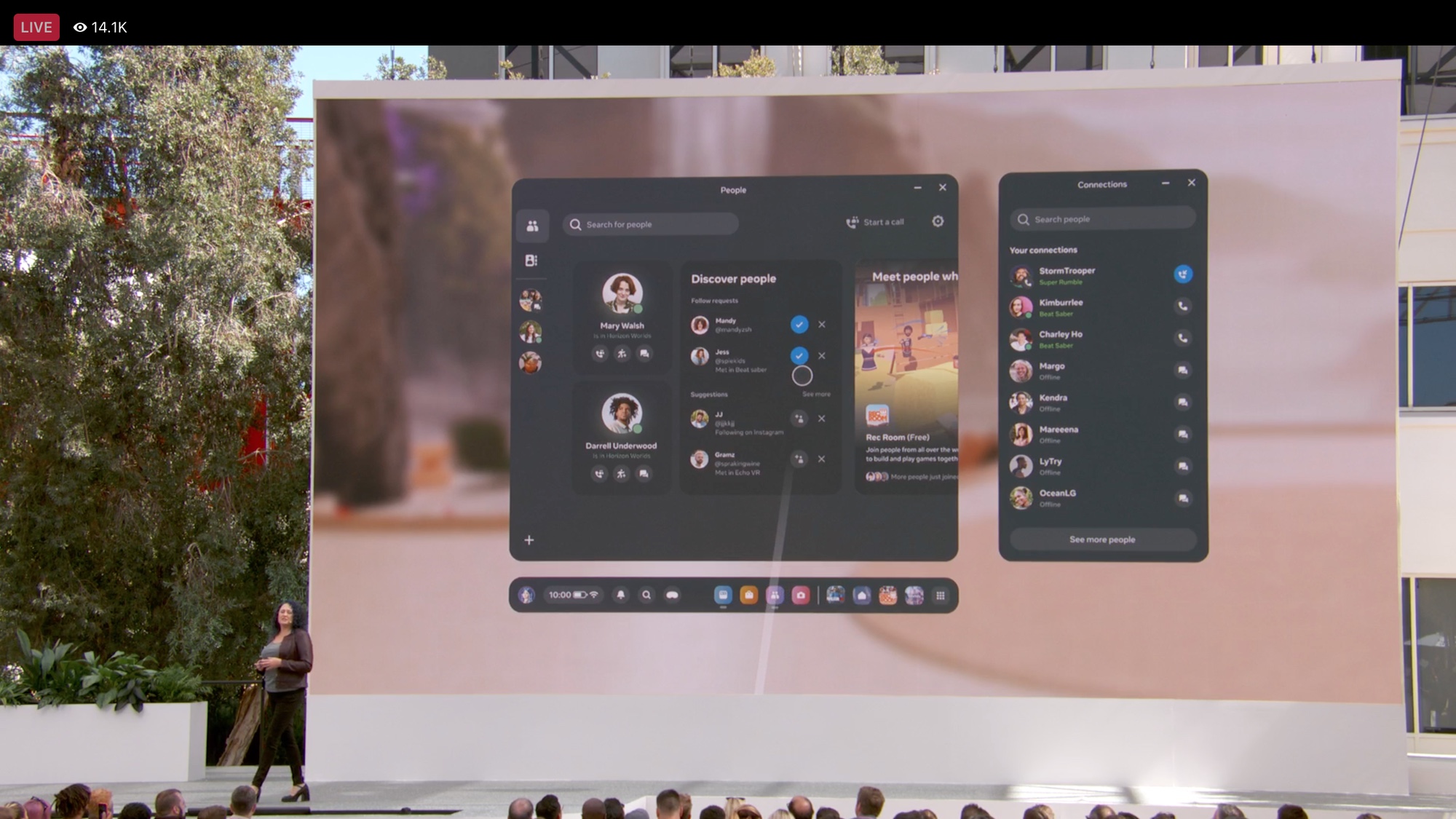
Now we're revisiting the content that's available for the Quest 3, which includes the entire existing Quest library. Meta says new developers and titles are also coming on board.
There's a Quest Plus subscription service that will deliver two games to you every month. The 512GB model of Quest 3 includes six months of Quest Plus for 3.
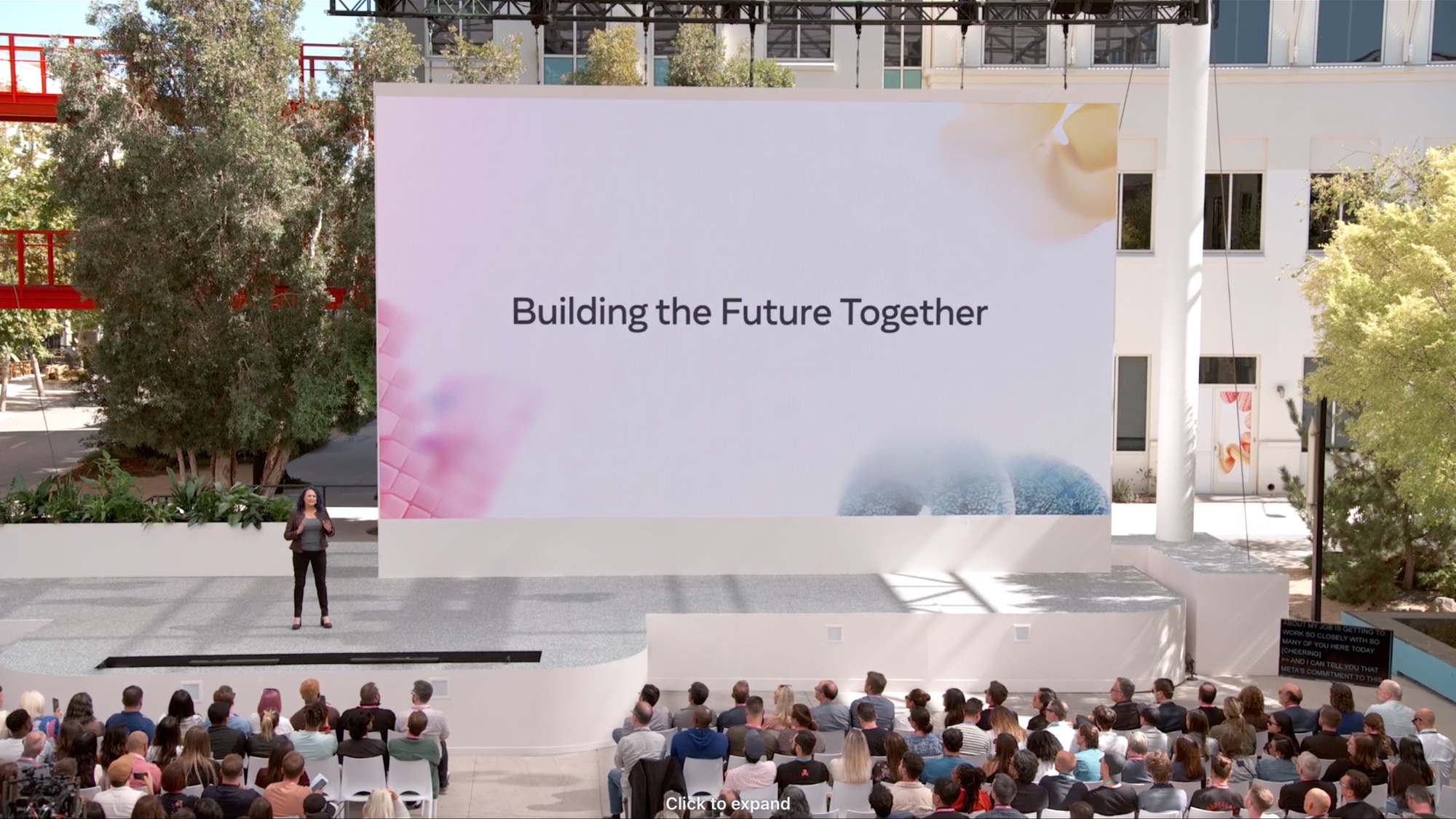
Fitness, live sports and entertainment are also well represented in the Quest library of titles and capabilities. We're also getting more on the productivity apps that are available, though they seem pretty company/industry-specific. That said, it sounds like Office apps are coming to Meta Quest devices next year. And in October, Meta Quest for Business launches — it's basically a way of deploying Quest in enterprises with device management features.
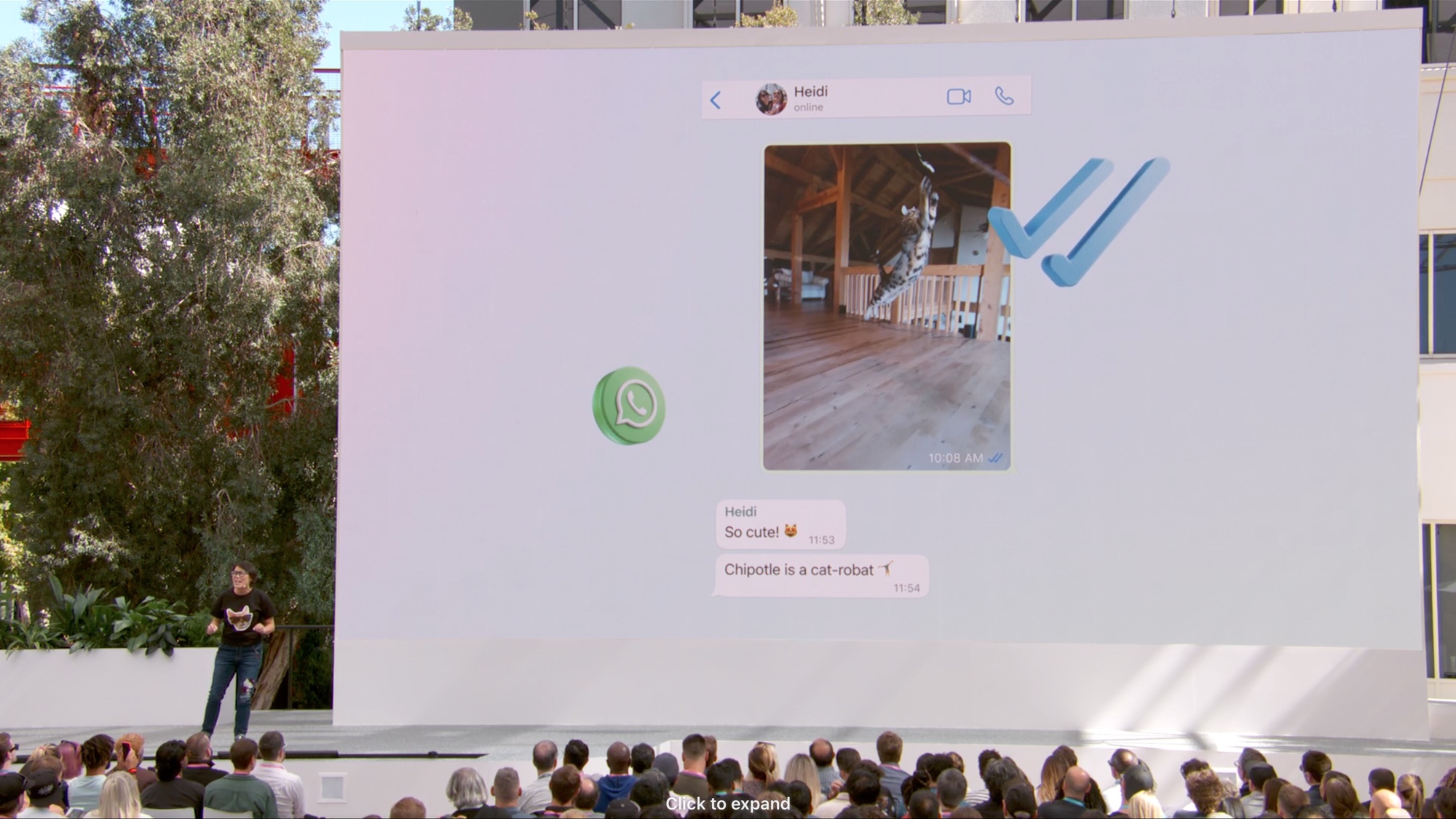
And now for the recap on the new Ray-Ban Meta smart glasses. You've got a 12MP camera that takes ultrawide photos and 1080p video. With 32GB of memory, you can store 8x what you could stash on the older glasses.
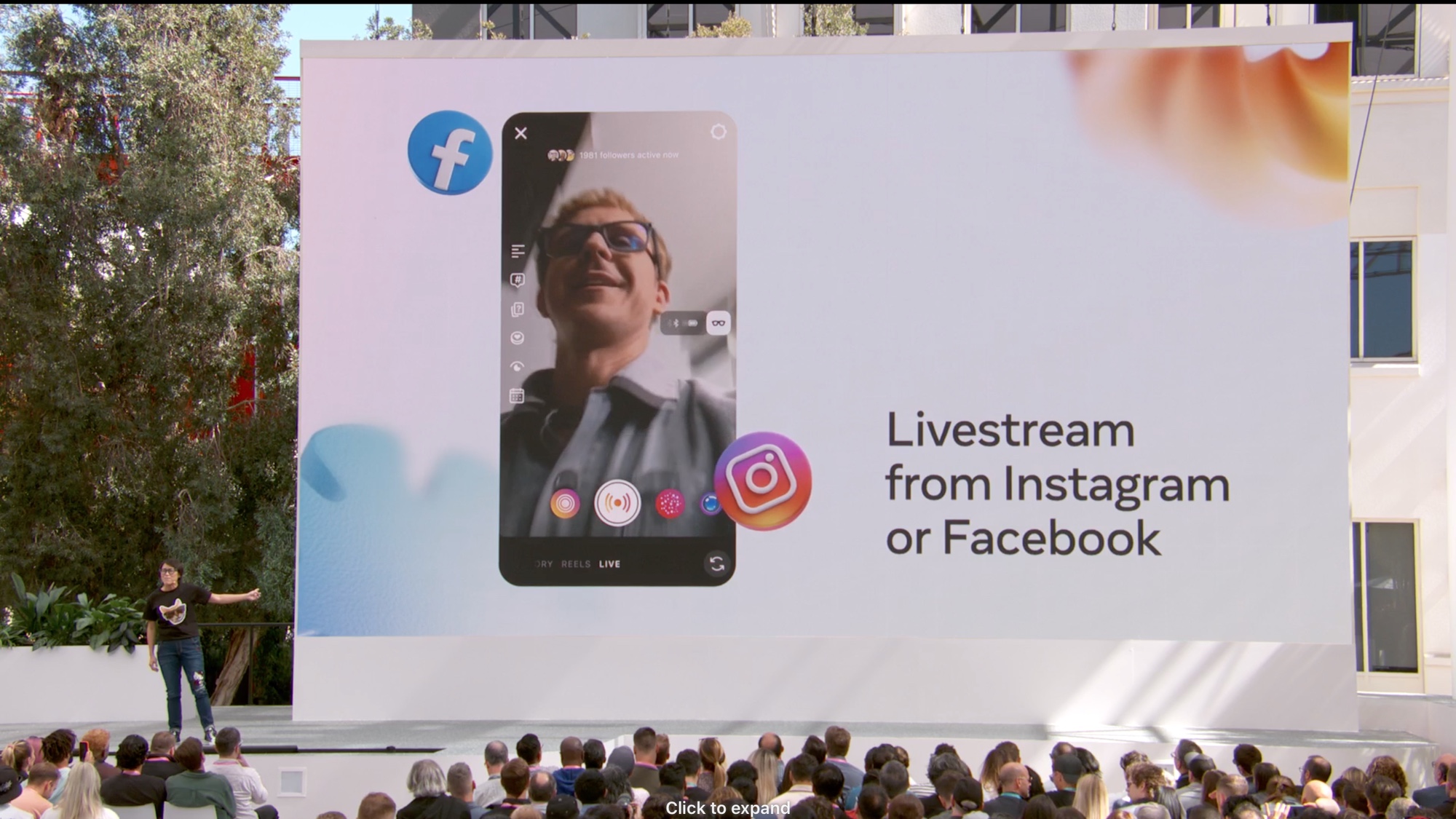
There's some talk of the audio improvements, particularly as it relates to the speakers. That's good, because audio quality on the original Ray-Ban glasses was one of our big complaints on the original. It's also a good idea if the assistant is taking a more central role.
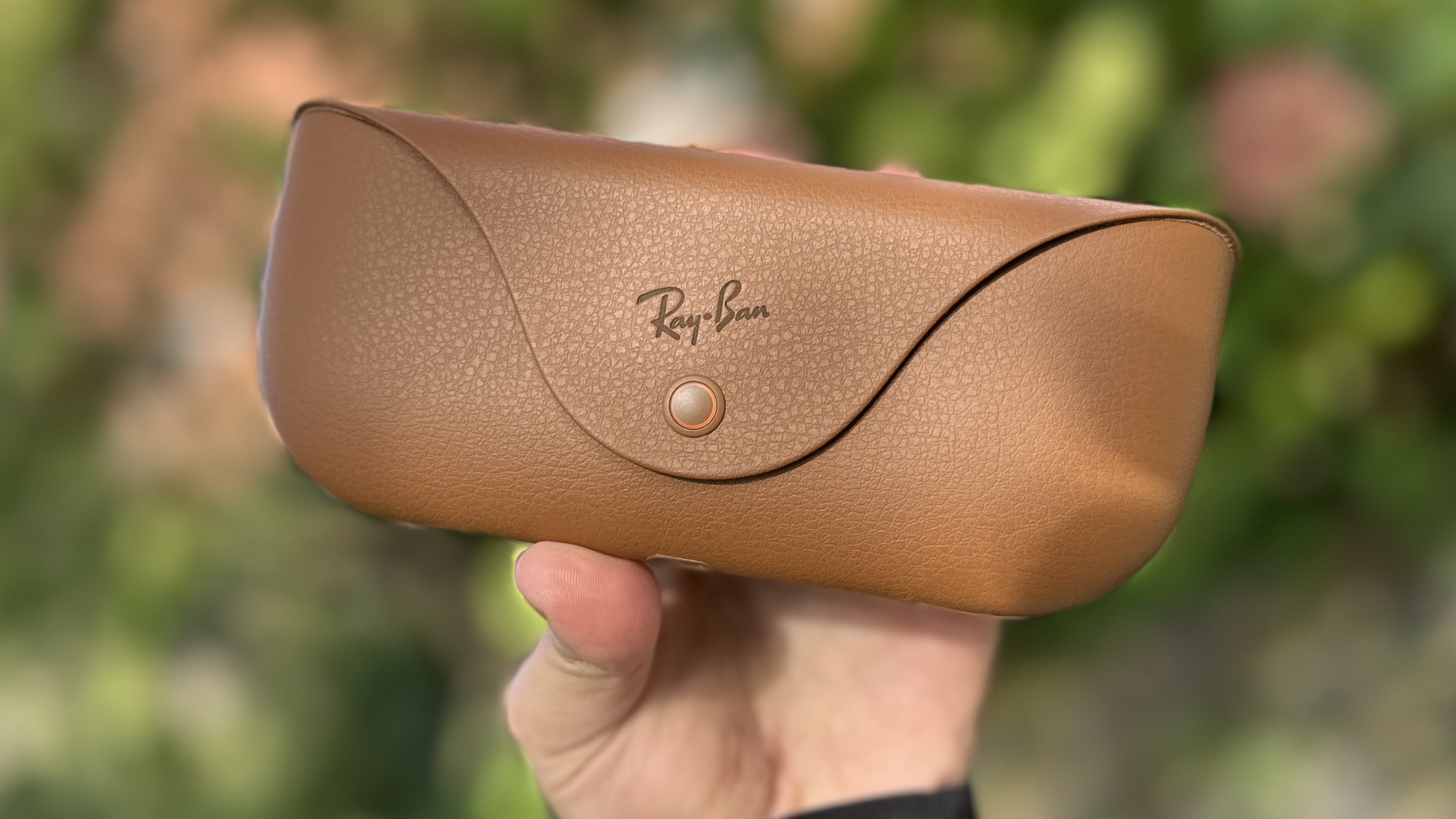
Something that caught my attention during the Ray-Ban recap — the glasses have a redesigned case that looks more like something you'd carry a pair of Ray-Bans in. But this is a charging case, too, and it supports 8 full charges, with a runtime of 6 hours of active use or 4 hours of live-streaming. That would be a big improvement over what the original glasses could do.
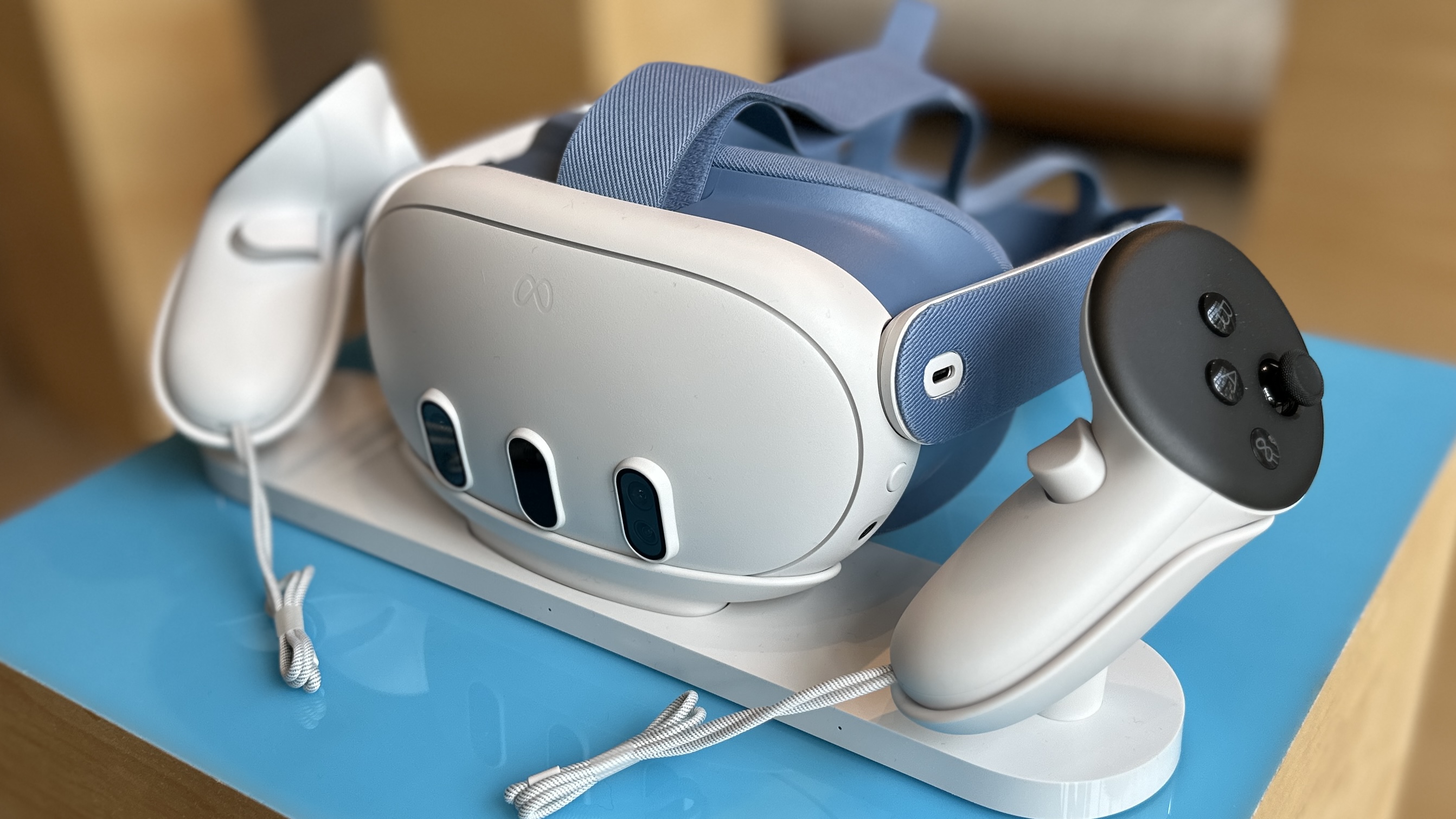
We're getting a recap of the AI news, and since that's more about developer tools and less about newly released products, we're going to wind down the live blog. Thanks for joining us, and we'll have some additional updates from Menlo Park and from our hands-on time with both the Meta Quest 3 and Ray-Bans Meta smart glasses.
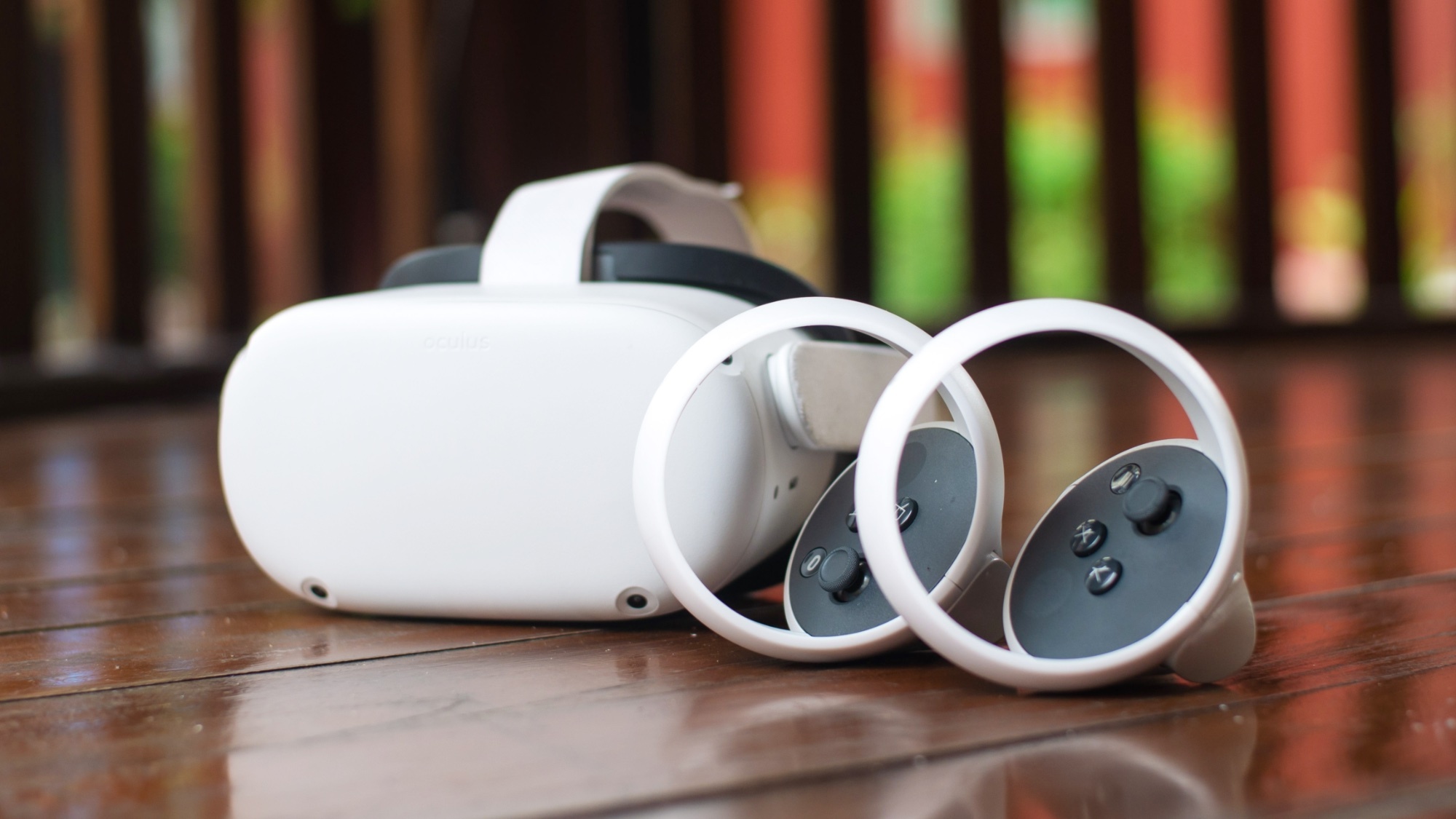
We've got an updated look at the Meta Quest 3 vs. Meta Quest 2, based on today's announcement and our hands-on time with both devices.
